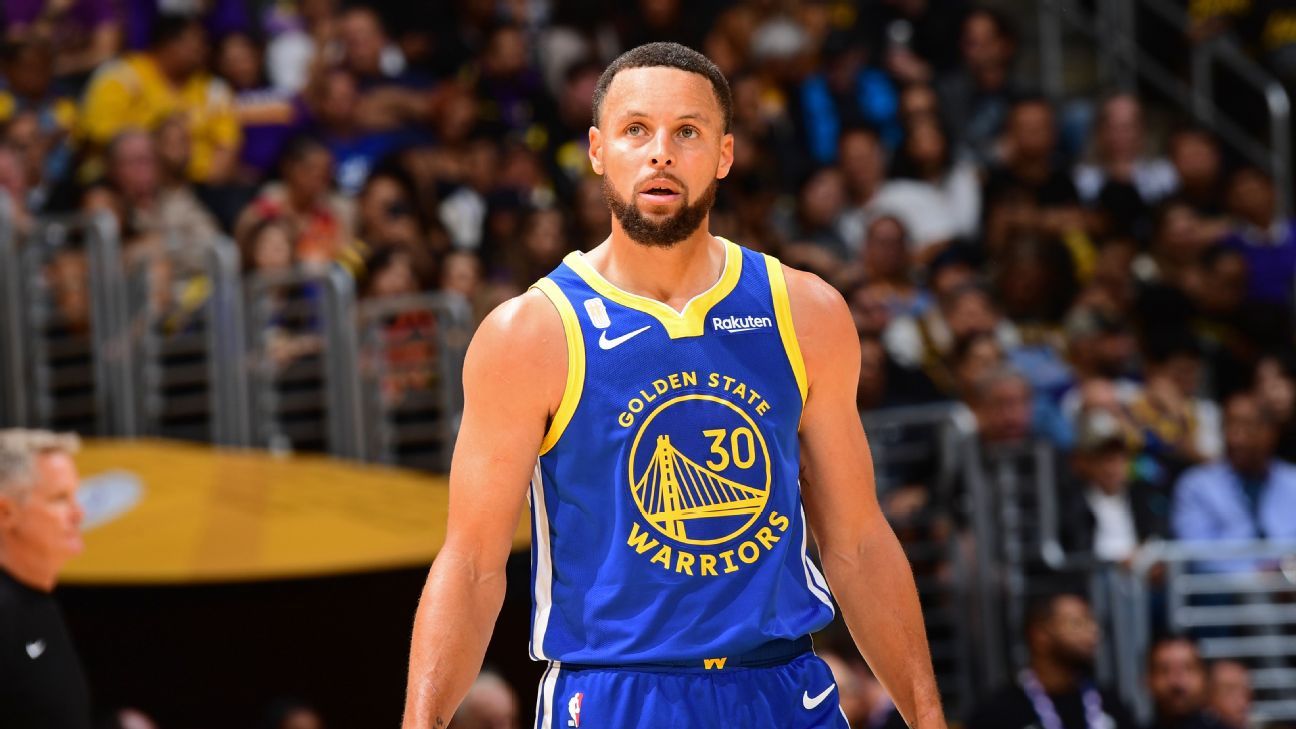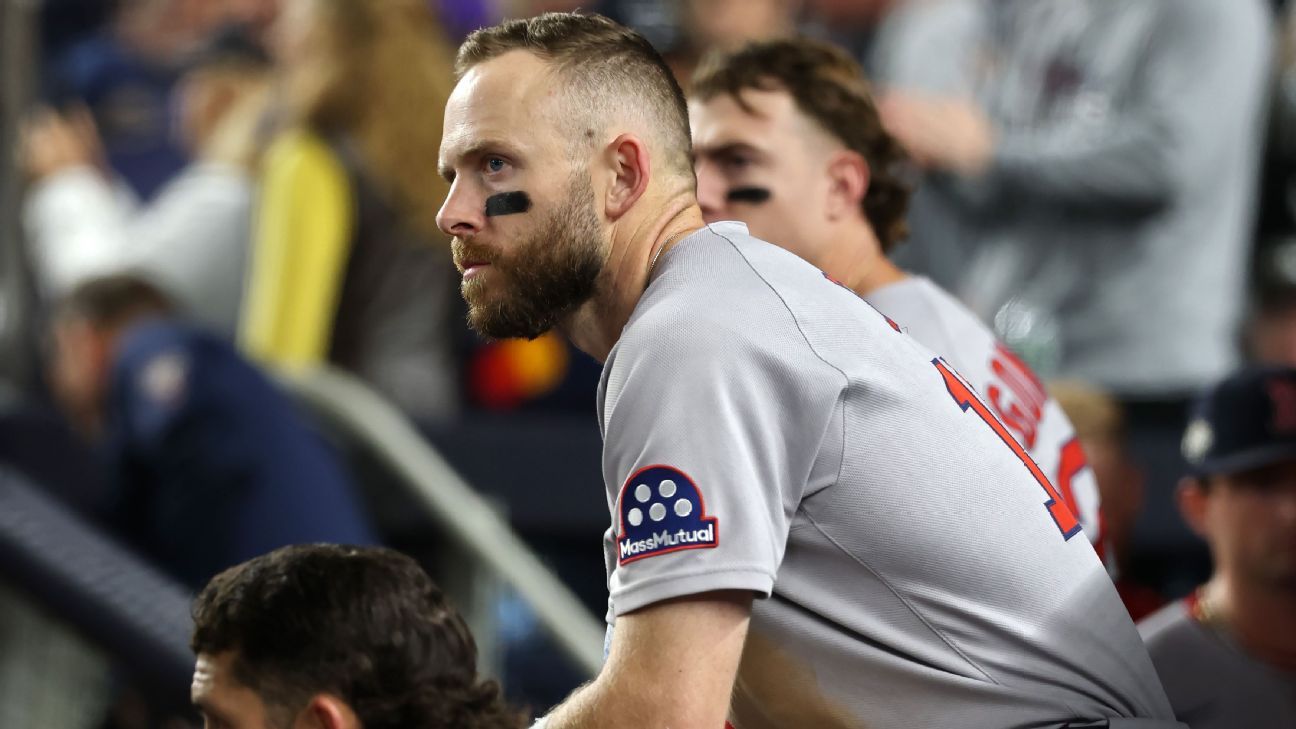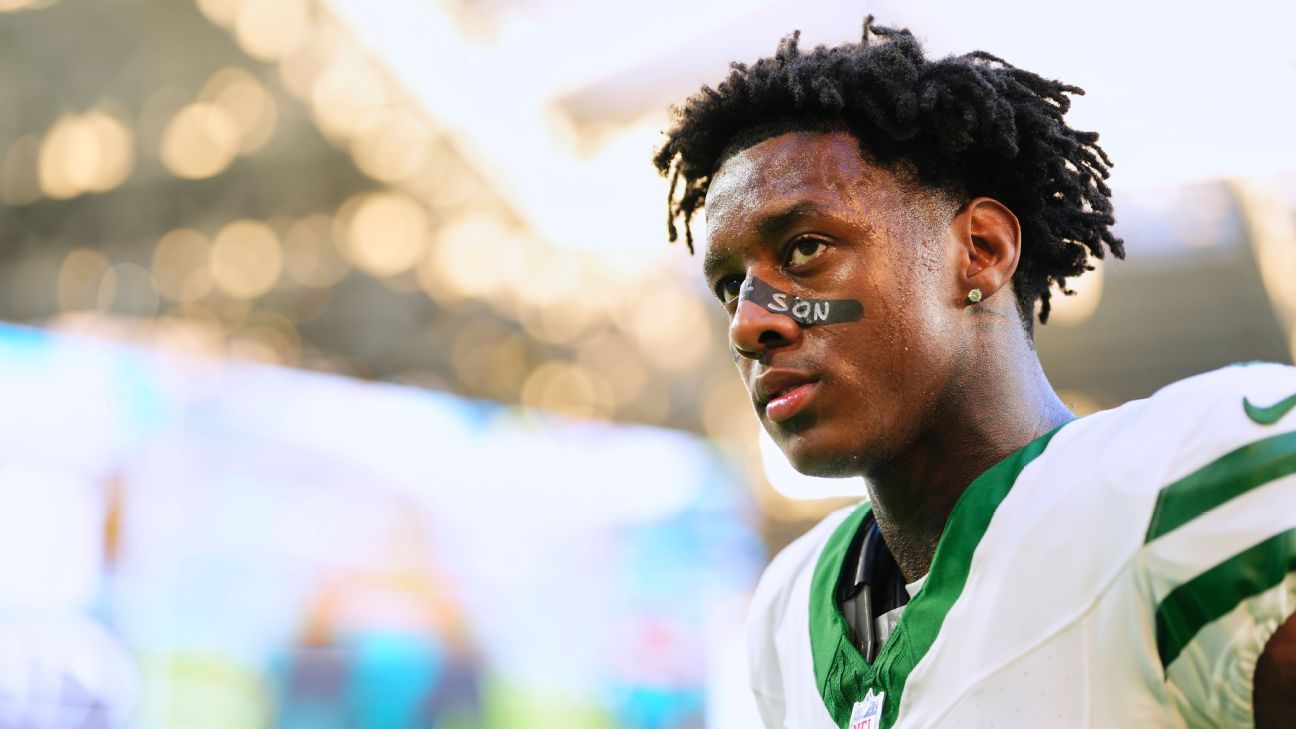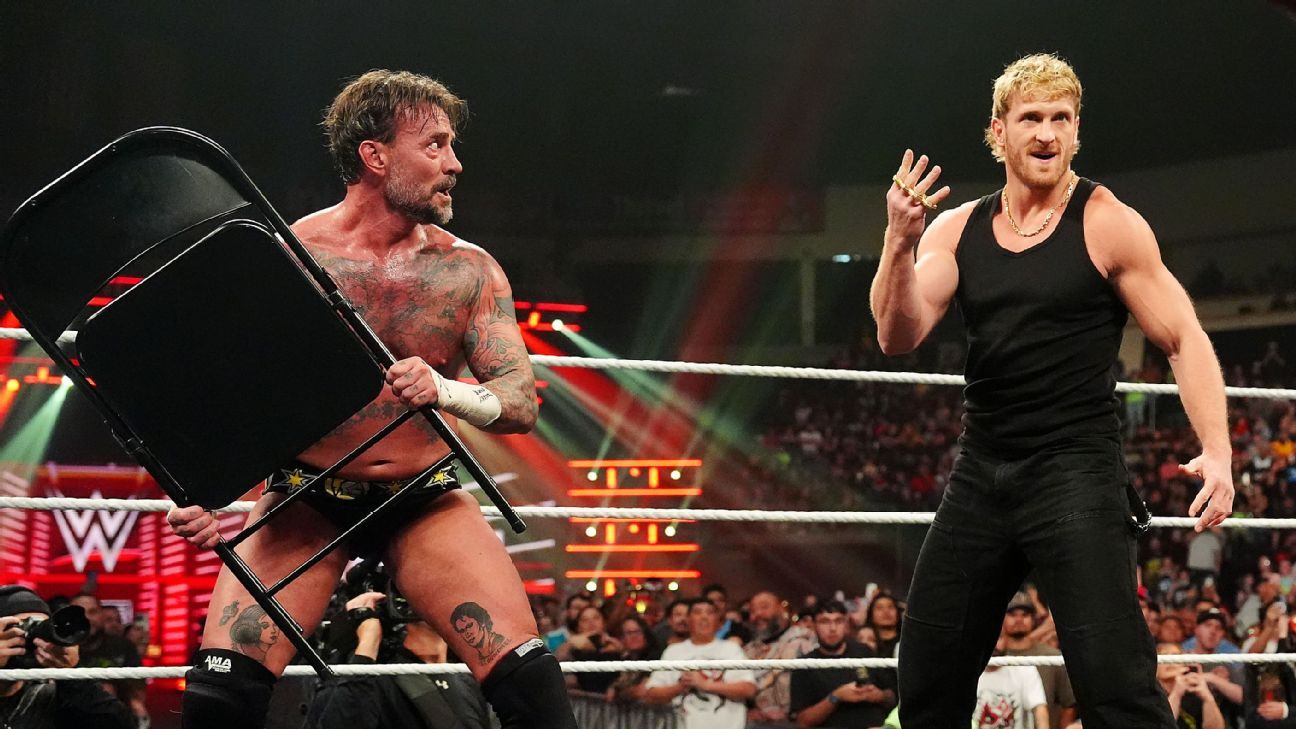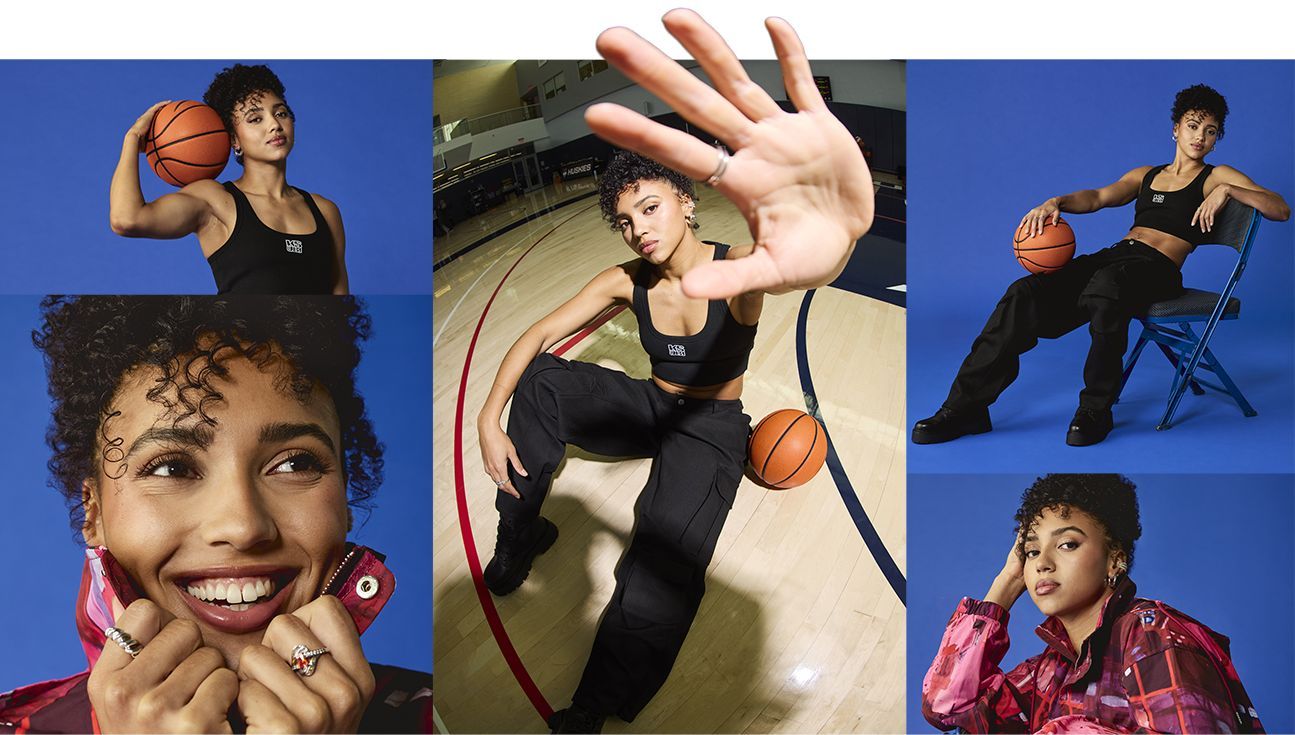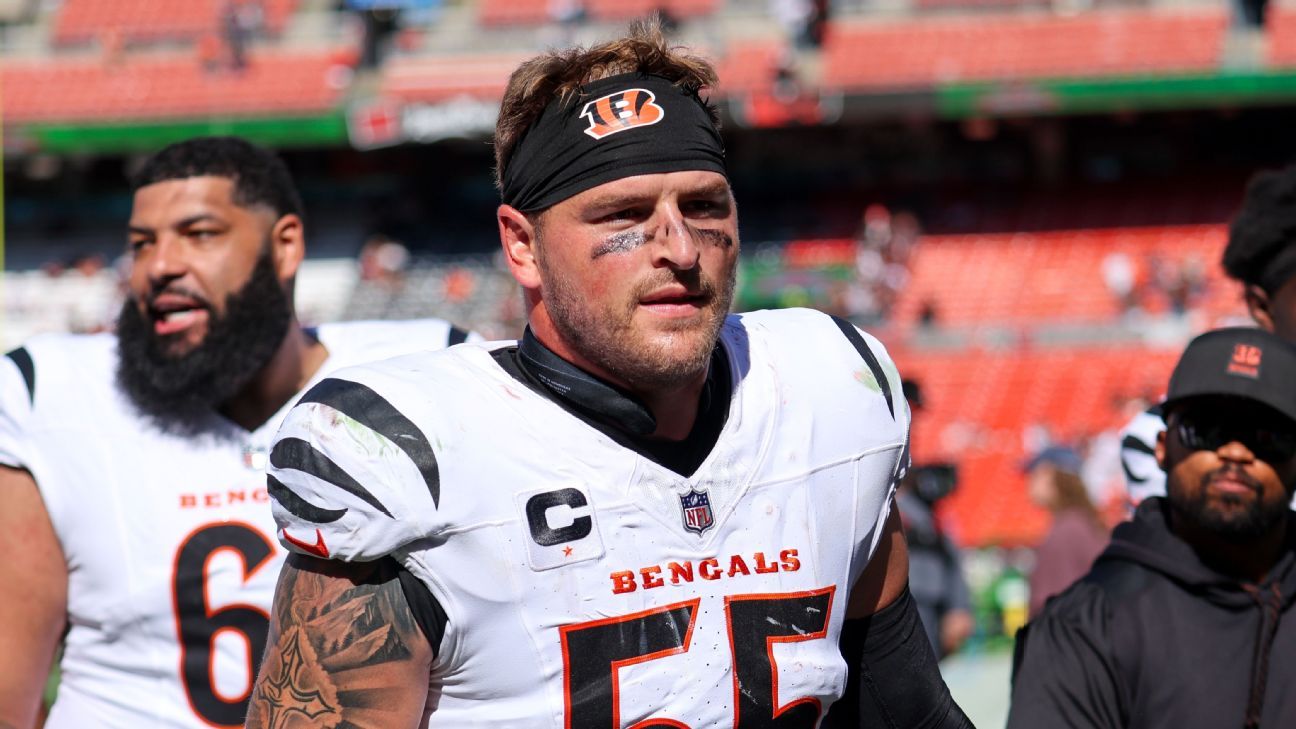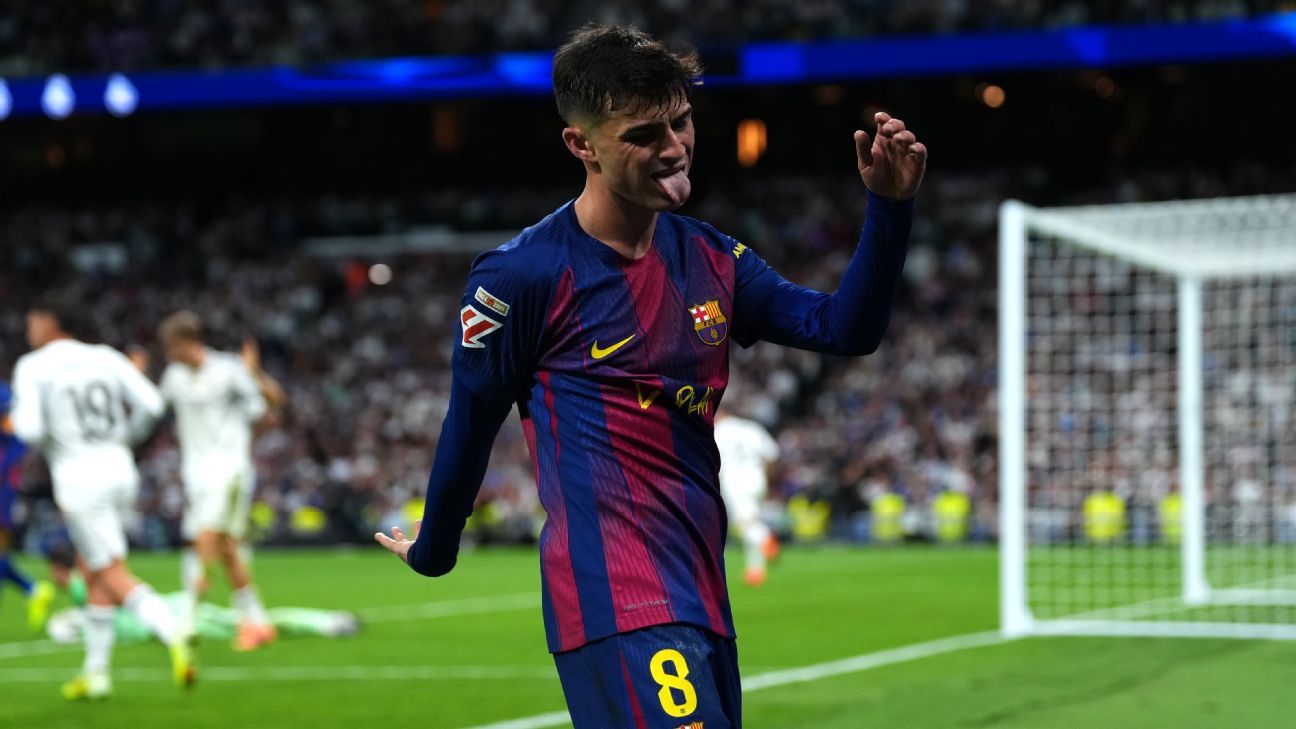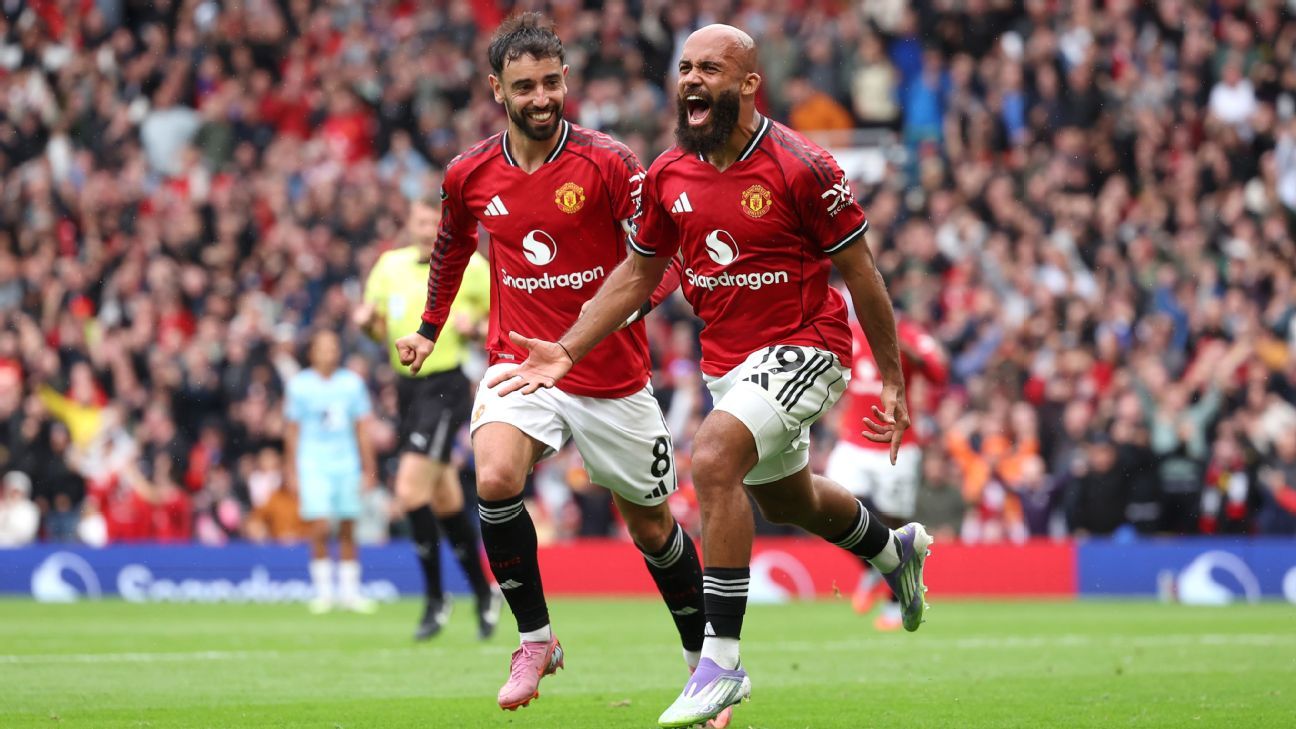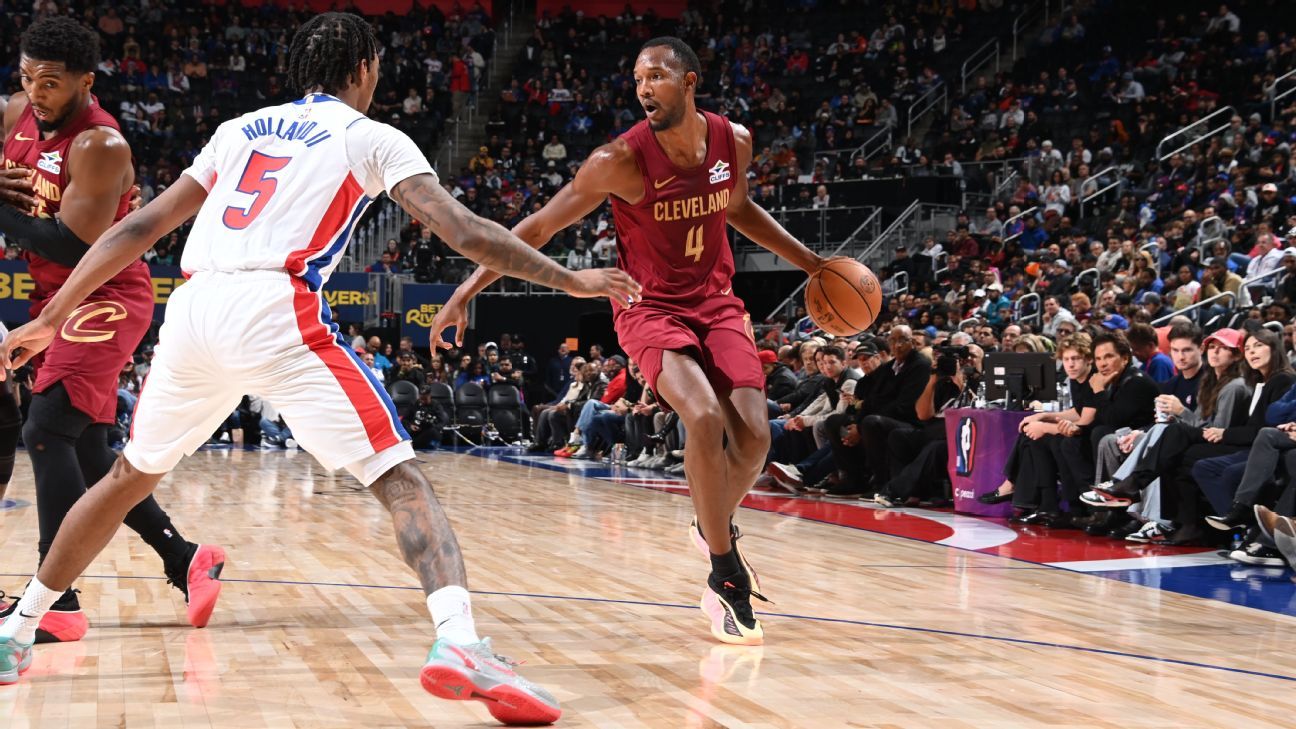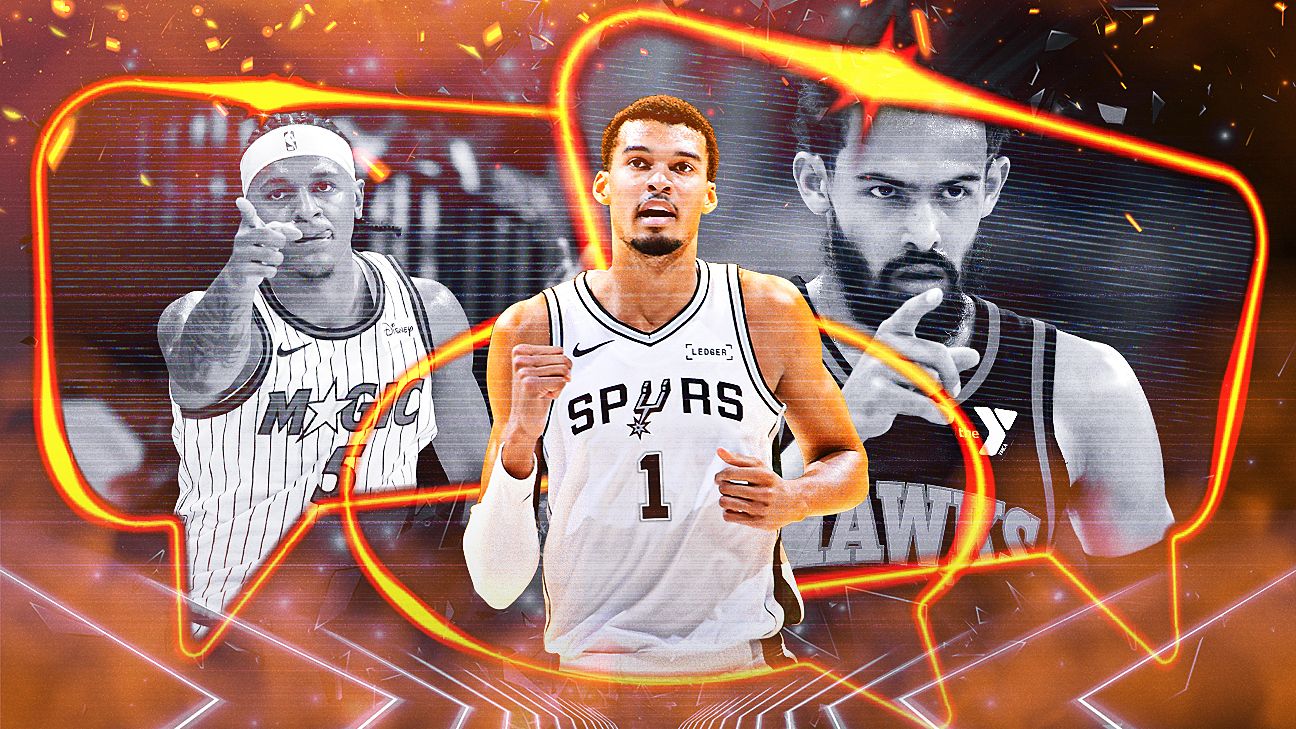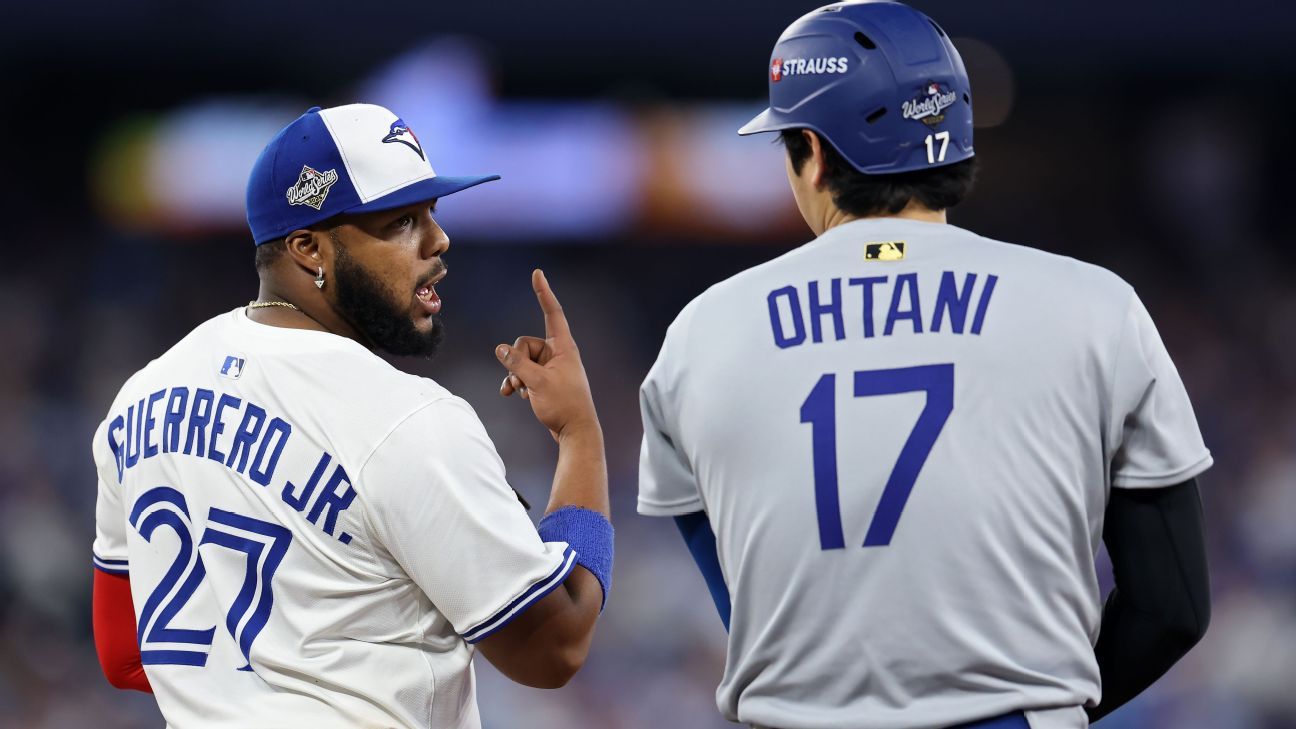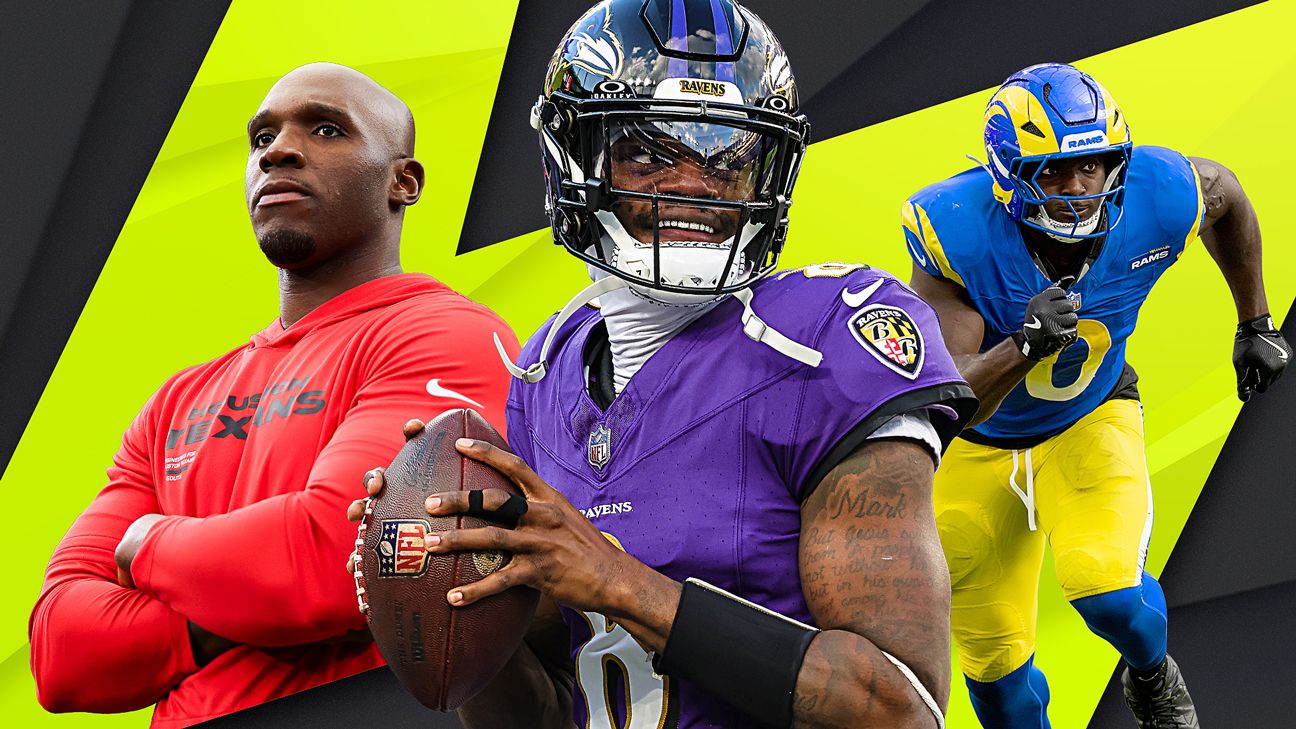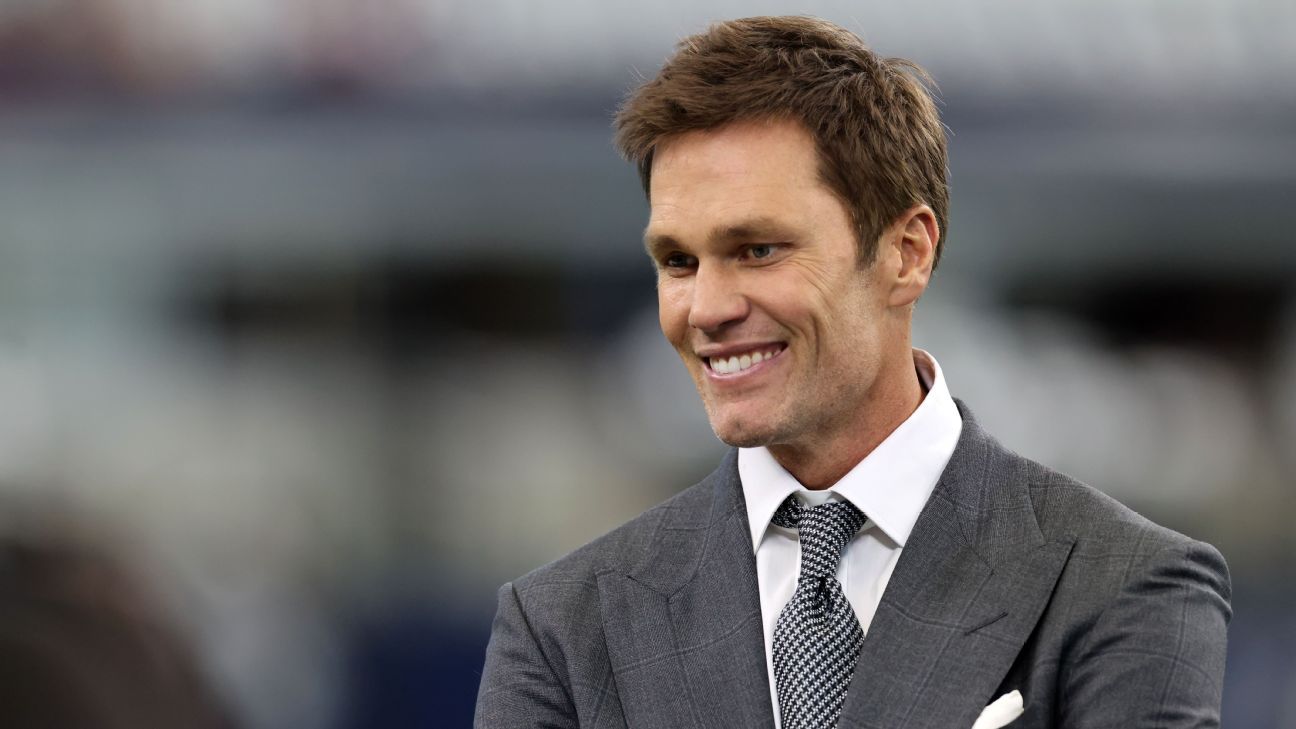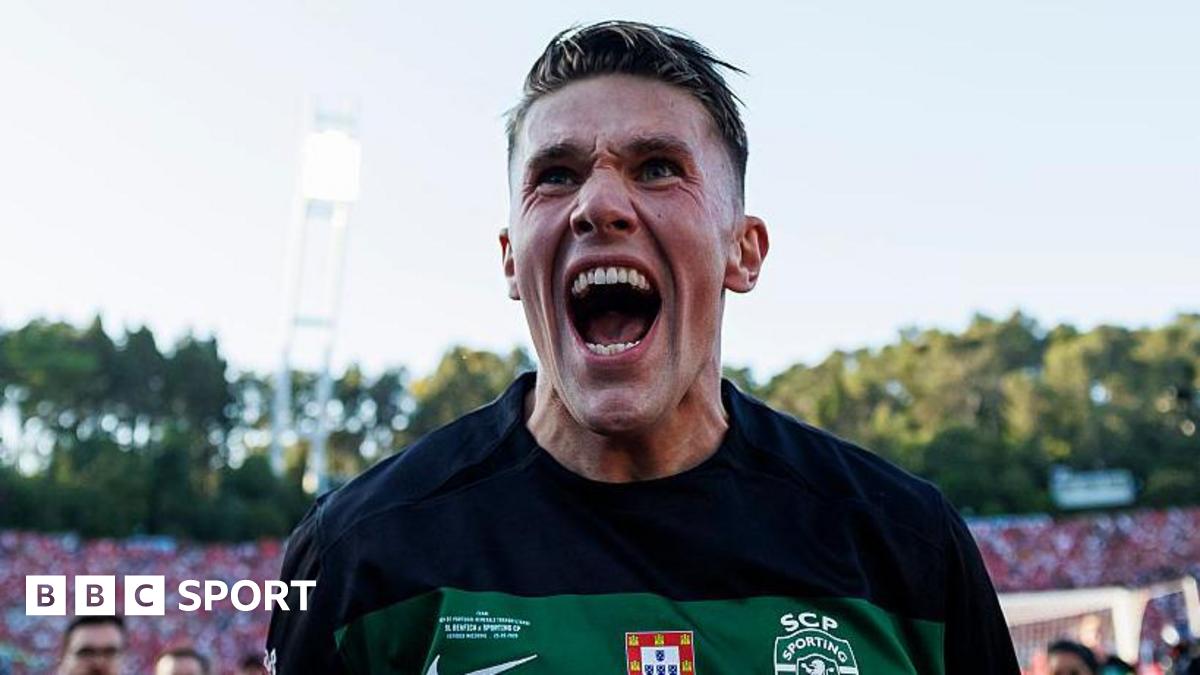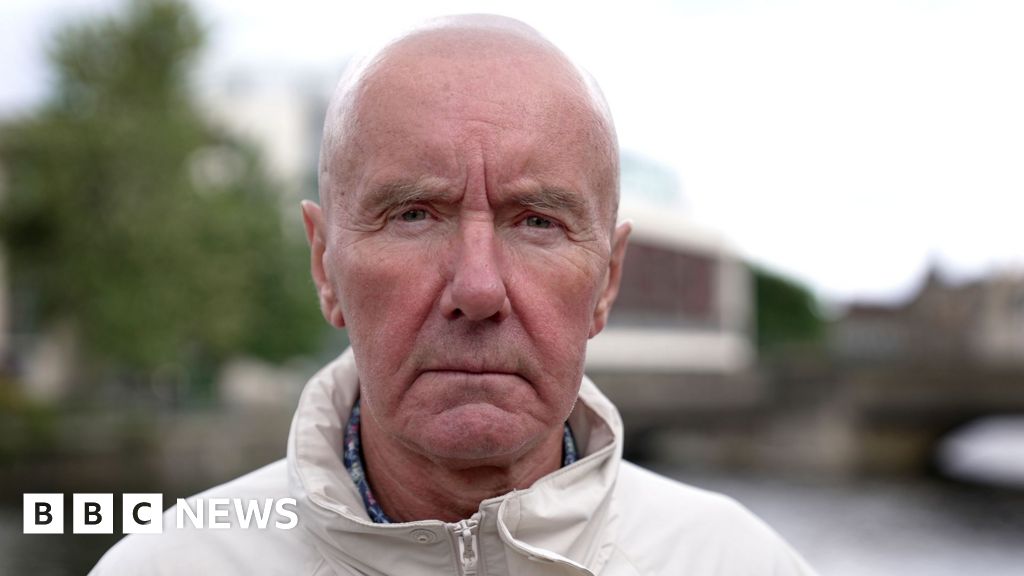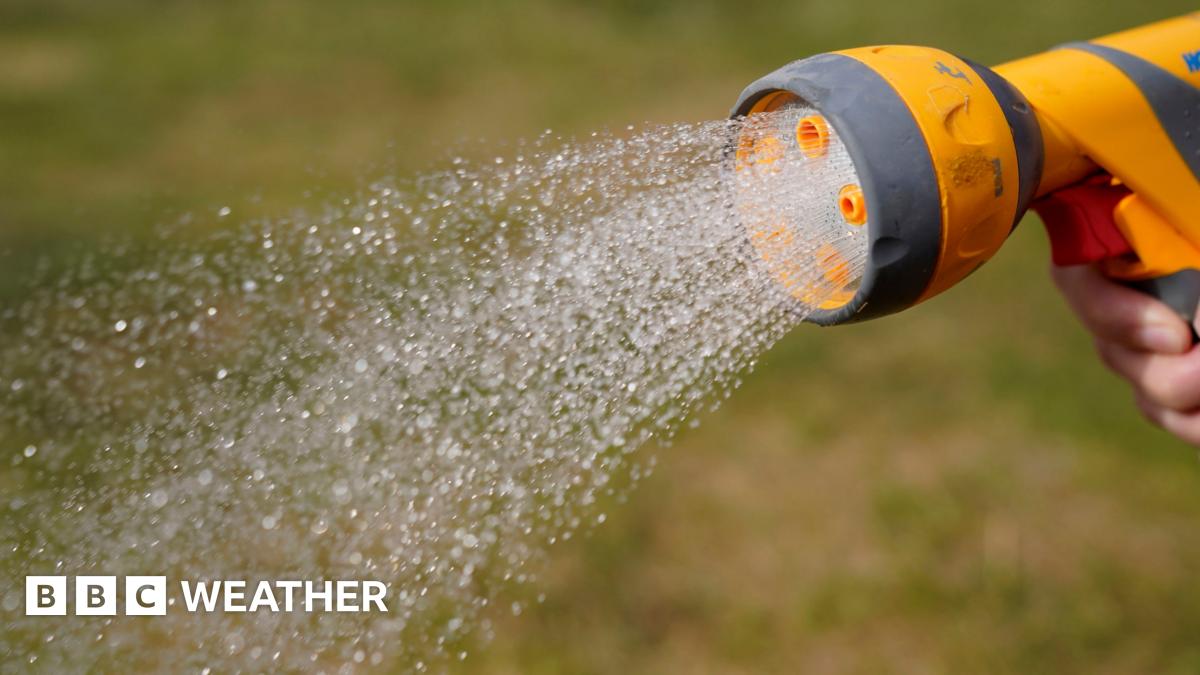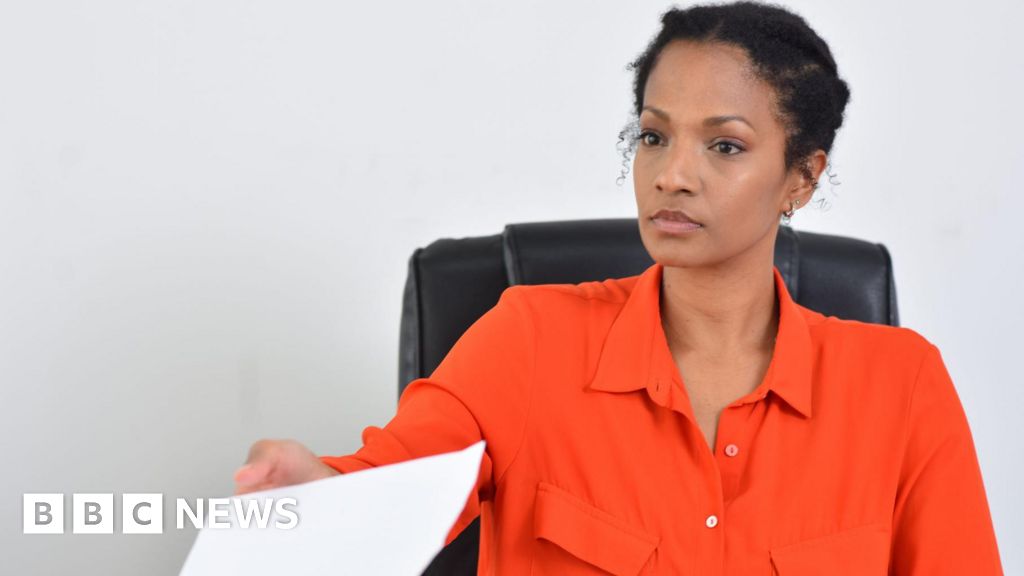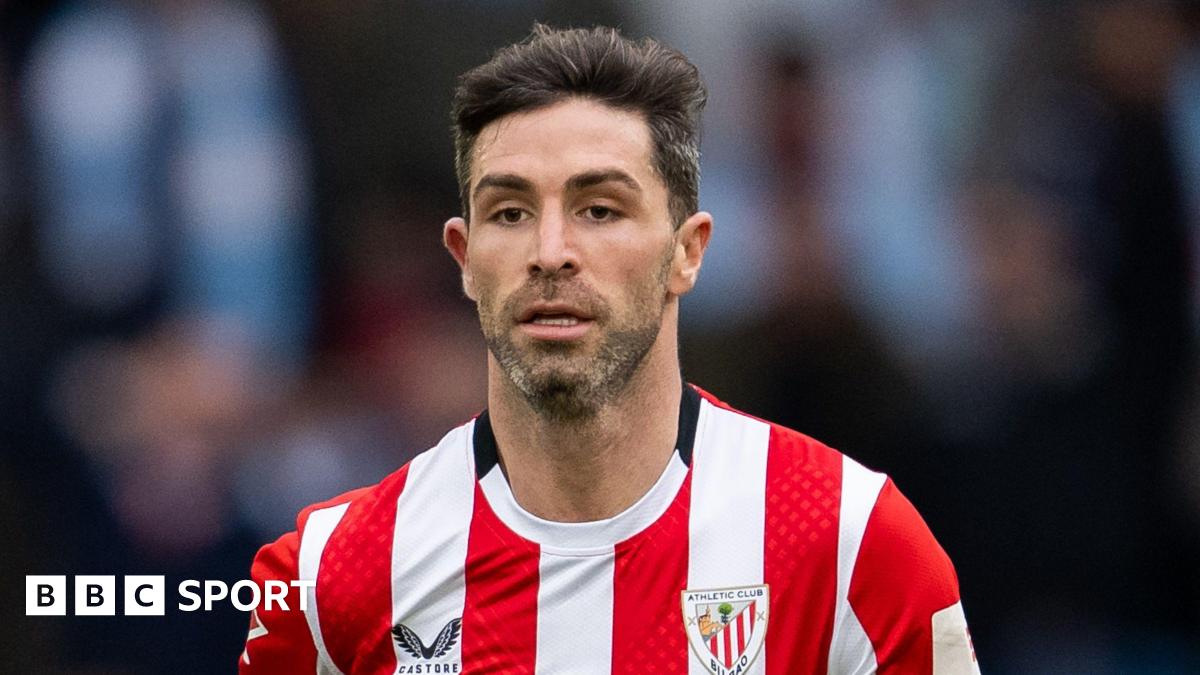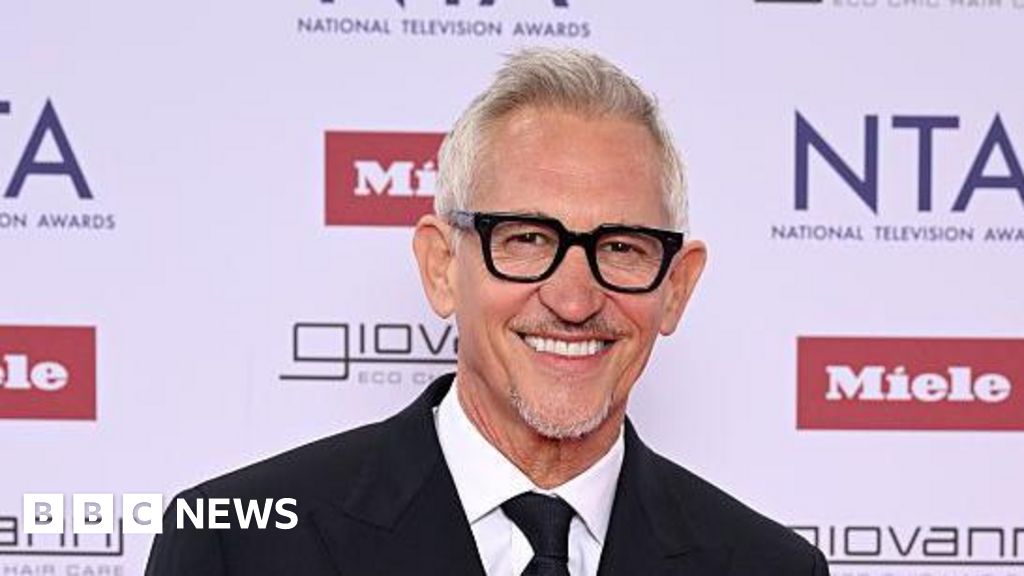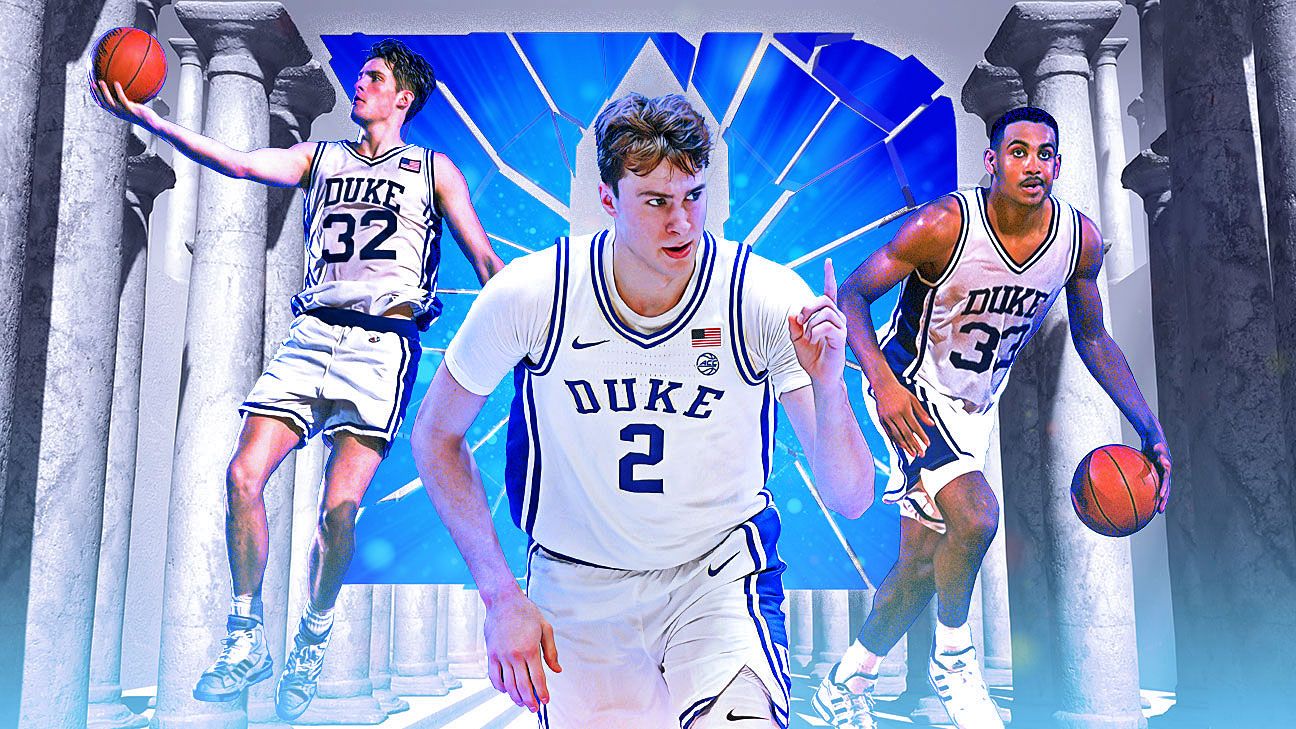
Dotun AkintoyeJul 16, 2025, 09:45 AM ET
- Dotun Akintoye is a staff writer at ESPN.
IT HAS TAKEN months to get here. Months of waiting, for Joel Embiid to play, for him not to play, for him to decide what, if anything, he wants to say about a season that once seemed so full of promise.
We're in his piano room. He's leaning back on a couch that seemed spacious until he eased his long body onto it. He's wearing a matching set -- pinstriped shorts and a camp collar shirt. His son, Arthur, peeks around corners from the hallway to see what we're up to. His wife, Anne de Paula, is upstairs preparing for her birthday celebration that evening. Decorations are being arranged in his dining room. It's the end of March, nine days before the knee surgery that will have a lot to say about Embiid's basketball fate.
He used to have fun with interviews. Before he ever played a game in the NBA, while he spent two years on the shelf rehabbing from surgeries to his right foot in the summers of 2014 and 2015, he was a media darling, both wry fabulist and helpless confessor.
But not after this past year. These days, he's wary, a little distracted by the Phillies game he's watching on his phone. I wonder if he may politely show me the door. We make small talk for a bit. He looks bored.
He does this with new people -- gives little of himself, pretends not to watch while he weighs and measures.
I ask if we can start, on the record. He agrees.
Embiid has many reasons to call this off. He thinks explaining himself will be distorted into defending himself, which will be caricatured as complaining. And look around -- his second child, a daughter, is on the way. His parents are taken care of. His family is secure for generations. He's an inspiration in Cameroon.
We're inside his lavish stone colonial, a mansion that sits perched atop a gently sloping hill in the Philadelphia suburbs. The hand towels in at least one of his 11 bathrooms are monogrammed with his initials -- what does he have to complain about?
"I care about how I'm going to be remembered when it comes to basketball, but not as a man," Embiid says. "As a man, you can't tell me nothing."
We're a few feet from each other, and I find myself edging forward in my chair to hear him. His voice is so small it seems to emphasize his other dimensions. This is the inward, solitary Joel Embiid, known by very few.
His friends are protective, verging on paranoid. They see Embiid as he sees himself, as someone beset on all sides. Which is to say, they love him on his terms.
"When you have his trust, it's kind of intoxicating," one says. "It's like you just penetrated this force field that nobody gets to be in."
Improbably, or inevitably, Embiid and I start talking about love.
"I've never been the one to have a lot of friends," he says. "And even then, with the ones that I consider close, I never try to go deep into anything."
"Why?" I ask.
"A quiet family. Dad, extremely quiet. Mom, quiet too. ... From the moment that I was really young, you could never really open up about anything."
He expects me to understand. We're both from the same part of the world, neighboring countries in West and Central Africa. We run through our short diaspora litany together: Beatings. Demanding fathers. Mothers more than their match.
What it is to be loved by such people: "You know they love you. ... But it is not all love like, 'Come here and give me a hug.' That's not happening. I never got any of that."
The need to defend them: "The way I was raised is also one of the main reasons why I'm here."
The need to renounce them, too: "The way I was raised is not the way I'm raising my kids."
Maybe it's the background we share. Maybe it's because he started therapy in the fall. Maybe it's the six months he's spent in the basketball void -- his fans on the verge of mutiny, his relationship with the 76ers shot through with strife, the late prime of his career interrupted by a lost season at 31 years old, just as he seemed to attain the full flowering of his brilliance -- maybe now he needs to talk.
Everyone else is. The Embiid discourse, let's call it; a narrative meant to assign a verdict of blame for why Embiid's transcendent ability has not produced a championship or even a Finals appearance. And there are summary statements bubbling now, too, career obituaries. The Ringer, citing his injuries, recently ranked Embiid -- who was league MVP in 2023 -- as the 84th best player in the NBA. Bleacher Report has him at 66th all-time.
After surgery to repair his meniscus last February, Embiid spent the 2024-25 season either recovering from or playing through pain. He played just 19 games and looked like himself in only a fraction of those. Now, he's in the middle of what he's rightly calling the "most important" offseason of his life, rebuilding his body again, preparing to launch into what he hopes will be, if all goes well, his final chapter as an elite-level player. It's not hysterical to wonder about the end -- we may be watching it. And if we are, then what has Joel Embiid been?
He's been misunderstood. He's not blameless in that. He's been dominant, and then hobbled or absent. He's been resented for that.
Even his most painful grief has been thrown in his face. At the start of Embiid's rookie season in 2014, his 13-year-old brother Arthur was hit by a truck and killed. The day Arthur died, Embiid ignored a series of phone calls. When he finally answered, it was terrible news.
Even now, phone calls can send a tremor through him, a quicksilver slice of panic -- someone is dead. In fact, he rarely answers texts or calls. His notifications are turned off.
Those who need to reach him do so through his assistant or his wife. His replies can take months.
"I have a reputation of being not a good texter," Embiid tells me, adding that he probably has 10,000 unread messages.
"You're kidding," I say.
He reaches for his phone, taps the screen and leans forward to show me. More than 9,500 unread texts and 875 missed calls. Some of the messages are years old.
"I just can't do it," he says, sitting back.
I ask who this annoys most in his life.
"Everybody," he says.
EMBIID'S GETTING COMFORTABLE, stretching his legs. I ask him why some people who adore him have jokingly called him an a--hole.
"I like to troll a lot," he says. "I wouldn't say I'm an a--hole."
He thinks on it for a second, then concedes, "At times, I can be an a--hole."
I first met Embiid in Chicago late last year, after he returned from a seven-game absence due to left knee issues. Loose, jovial talk filled the visitors' locker room at United Center, an air of celebration. Sixers veteran guard Kyle Lowry ordered four trays of wings from Chicago's famous Harold's Chicken.
After a cold start against the Bulls, Embiid looked like himself in an eight-point victory. Lithe and destructive, a one-man revolution of hybrid plays who has layered skill on skill for years. Watch him think his way around the court, moving, as he did that afternoon, between low-post bully to mid-post spinning fadeaway artist to metronomic rise-up shooter at the elbows and nail. See the film study, the drills, the painstaking work. This is talent working on itself, shaping and reshaping.
He outscored the Bulls by himself in the second quarter.
His offense was a sideshow compared to what he did to then-Bulls guard Zach LaVine late in the second. LaVine attacked Embiid downhill off a screen, swerving left and wrong-footing Embiid. What happened next happened very slowly and very fast all at once. Embiid whirled, turning his back to LaVine for a moment. Against 99% of the NBA, LaVine wins the duel from this position. But Embiid came out of his twirl between LaVine and the rim. They jumped together, Embiid's momentum carrying him backward, a high hand turning what looked like a LaVine dunk into a contested miss.
No coach in the world would teach that. No drill can prepare you for it. At Embiid's best, there's no one to compare him to. Not Nikola Jokic or Luka Doncic or Shai Gilgeous-Alexander, who for all his offensive gifts can't turn the interior of the defense into a black hole. Not Giannis Antetokounmpo or Anthony Davis, who for all their versatility can't ascend into a trance of pure jump shooting.
You could feel it in the locker room; if Embiid were healthy enough to play like that, this team could achieve anything. It was early December, and there was still enough time to hope.
Embiid eyed the Harold's Chicken spread, plucked a wing and walked to his locker. After a wait, he fronted the media scrum.
I asked him how he found a rhythm after starting 0-for-7 from the field. Postgame white noise.
"I just got lucky and started making shots," Embiid said.
Refusing to smarten up, I asked, "Does it really feel like luck?"
"Yeah, it is luck."
I stood directly in front of him. His expression was frozen in an affectation of boredom. He held that for a tense second before a smile started to play at the corners of his mouth.
Everyone cracked up.
This is a perquisite Joel Embiid experience, one where he decides how full of it you are by watching as you try to discern how full of it he is.
During his freshman year at Kansas, Embiid would sometimes pretend his English wasn't good enough to understand what people were saying. He started to tell an exoticizing story in those days, that as a boy in Cameroon, he wandered alone into the jungle and killed a lion as a rite of passage.
"People actually believed him," his college coach, Bill Self, recalls. "There was a lot of things that he would do in fun, but I never knew him to be much of a talker as far as expressing true feelings."
The jokes worked as shelters, places to hide himself. Instead of being known, he subsisted on being known as clever.
Watching him in the locker room in Chicago, I imagined him looking at his college teammates, trying not to smirk at their credulity. A reporter asked how hard he worked to get back for this game.
"Trust the process," Embiid said, referencing the Sixers' 2013-2016 tanking strategy from which his nickname derives. His smile is gone.
But stony hostility doesn't suit him. He's sensitive, about to display his wounds. "I got to give short answers, because when I give long answers, they try to twist my words," Embiid said, turning to a couple of teammates.
"Good answer! Good answer!" Tyrese Maxey called out from his locker.
We stood in the aftermath of a galling media cycle. It started in late October when a Philadelphia Inquirer writer mentioned Embiid's son and his late brother in a column chastising Embiid's lack of professionalism and inability to stay in shape. The column implied there was a gap between Embiid's conduct and his public statements about playing to honor his brother's memory.
"I've done way too much for this city, putting myself at risk," Embiid responded days later. "I've done way too much for this f---ing city to be treated like this."
When the columnist showed up in the locker room the next day, the two men came face to face. "The next time you bring up my dead brother and my son again, you are going to see what I'm going to do to you," Embiid said. The altercation ended when Embiid shoved the columnist and Sixers staff stepped in between them. The NBA suspended Embiid three games without pay.
Months later, the column still gnaws at him.
"I don't care if the NBA wants to fine me $1 million, $2 million, $5 million, $10 million, I would still do it," Embiid says. "If he walked up to me just like he did, I would push him away again."
Embiid hasn't stopped blaming himself for leaving his brother in Cameroon to play basketball in 2011. Francois Nyam, one of his agents in 2014, called Embiid the night Arthur died. He says the first thing Embiid managed to say after sobbing was, "That's my fault. I'm a piece of s---."
Embiid's family had planned to be together on draft night in 2014, but after Embiid's first foot surgery, doctors told him not to fly. He remained in Los Angeles at his agent's home while Arthur stayed with family friends on the East Coast before returning to Cameroon. The accident happened nearly four months later. The brothers hadn't seen each other in three years.
"It's never going to change," Embiid says, all but whispering. "I still feel it."
WEEKS AFTER the locker room altercation in November, the Sixers held a closed-door meeting to address the team's calamitous 2-11 start.
Details of the meeting leaked the following day. Maxey, who Embiid considers one of his best friends, confronted Embiid about being late for team events and dragging the morale of the group down.
Embiid told a reporter, "Whoever leaked that is a real piece of s---." He reportedly vowed to find the source.
"I know who leaked it," Embiid tells me during a late-night phone call after the season ends.
"You do?"
"Yeah, but I'm not going to -- the past is the past," Embiid says. "The one thing I'll say is, it's hard being around people that do those sorts of stuff.
"That goes back to the trust thing. Once you cross that -- you can't expect me to be part of a team meeting again. That's just not going to happen."
"The way you're talking, it sounds like this person is still around," I say.
"I don't know," he says.
"Come on, Joel, you know who's on your team right now," I say, laughing.
"Free agency just started," he says. "I don't know what's going on."
"So there's a chance this person may not be around next season," I say.
"No," he says. "There's a chance they're still around."
TAKE A SENTIMENTAL journey: A young Joel Embiid watches Kobe Bryant win his fourth championship in 2009 and falls in love with basketball. He starts playing seriously at 16. In July 2011, he is discovered at a camp in Yaoundé, Cameroon's capital and Embiid's hometown. He leaves his family behind and moves to the U.S. as a raw but gifted prospect two months later. He improves at a miraculous rate, is recruited by several elite programs and ends up at Kansas after witnessing Late Night in the Phog in Lawrence. He is the No. 3 pick in the 2014 NBA draft. You know the rest.
It's a fairy-tale, one that obscures a period of profound rupture for Embiid. He was first shepherded by former NBA player Luc Mbah a Moute and Nyam to Montverde Academy, a prep school west of Orlando, Florida. After struggling for playing time his first year, Embiid was relocated again, this time to The Rock School in Gainesville, Florida.
With the help of his new coach at The Rock, Embiid moved in with a host family. Marcy Hansen's first thought when she saw 18-year-old Joel Embiid was that there was no way he would be able to sleep on her daughter's recently vacated twin mattress.
He was nearing 7 feet tall. His accent was thick, his English halting. If someone asked him what city he lived in, the best he could come up with was "Florida." Hansen noticed quickly that he was struggling. He would lie to his parents on the phone, insisting he was well, then sink into a morose silence.
There has always been something lonely in Embiid, something he can't quite explain. One of his most vivid childhood memories is of visiting France on a family vacation around the age of 12. But while everyone left to go sightseeing, Joel stubbornly holed up in his aunt's apartment, playing video games. His parents left him out of subsequent family trips to France, bringing just his two siblings.
"From then, it never really changed," he says.
Hansen was desperate to cheer him up and connect with him. She made him chocolate chip cookies and brought him Chinese takeout for lunch. She hoped her son would bond with him over basketball, but Joel was too closed off.
"It felt weird for me," Embiid remembers. "I got there, one of the first things that I saw was guns."
Hansen's husband, Ric, is a veteran and avid hunter. Embiid's father, Thomas, was an officer in Cameroon's military, but Embiid didn't know people lived with so many guns in their homes.
"I don't think anybody understands my point of view," Embiid tells me. "Why I was reserved and why I liked to be in my room, why I tried to lock the door...I was kind of scared.
Basketball was little consolation. Embiid hardly bonded with teammates; they noticed the distance and left him alone. He told his coach he had preferred the dorms at Montverde, where he roomed with another international student who also spoke very little English.
"He was thrown into a totally different world and then thrown into another world, within a year," Hansen says. "He probably didn't let us in as much as I would have liked."
Eventually, Ric approached Embiid's coach, and they arranged for Joel to move in with one of the team's assistant coaches.
Memories of Embiid from this period are often bright and vivid and totally superficial: He was in the room, he was friendly, tall, he ate something sweet, he didn't seem to be paying attention until he would supply a sharp quip, surprising people. He is beloved, missed, cheered from afar.
Nothing was above Embiid's suspicion, not even evaluations of his talent. "He didn't know that he was going to be a D-1 player, which is kind of crazy to me," says Freddy Bitondo, a friend and former Rock teammate. "He would tell me stuff, like, 'If basketball don't work, I'll just go to a school for four years and find a job.' And I'm looking at him, like, 'Yo, you're killing us in practice, what are you talking about, bro?'"
When he arrived at Kansas, Embiid was convinced he would redshirt as a freshman and spend five years in school. "You're going to be the best guy I've ever had," Self told Embiid.
By the end of his freshman season in spring 2014, Embiid was a projected No. 1 pick. He went to Self and confessed he didn't feel ready. He didn't know how to eat healthy. He didn't even know how to drive.
"I actually decided to stay," he says. "In my head, I was like, 'I don't deserve this. I only averaged 11 points.' I didn't know much about basketball. I didn't understand how the whole system worked."
But those closest to him -- his father, Mbah a Moute and Nyam -- told Embiid it was time to go. He packed his bags and moved to his agent's mansion in Los Angeles.
While there, recovering after his first navicular bone surgery, Embiid remembers returning late one night and realizing he didn't know the security code to get back inside. So, he did what any teenager might do: He jumped the fence, his surgically repaired right foot still in a cast, and set off the intruder alarm.
He was, at the time, less than three years removed from the JV team at Montverde, where he once caught an outlet pass alone under the basket, only to leap cluelessly in the air, past the backboard and out of bounds. His life was being accelerated at a speed he could not comprehend, propelled by a story about himself he did not believe, supplied by people he did not trust.
"I never knew how good I was," Embiid says. "What are these people talking about? What am I going to do about it? Am I going to believe what they say?"
THE MOMENT Adam Silver announced Embiid as the No. 3 pick in the 2014 NBA draft, ESPN's feed cut to Embiid staring blankly into the camera.
"He seems confused," former ESPN columnist Bill Simmons said on the broadcast. "Get Joel some coffee."
Embiid later explained that the tape was delayed, and the broadcast eventually played his actual reaction -- he pumped his fists and smiled. But in some ways, he's never fully caught up to that delay.
Embiid and the 76ers waited two years for his foot to heal. Reports at the time claimed that he hadn't been taking his rehab and nutrition seriously. His third year in the league (but first on the court) was cut short by a meniscus tear in the same left knee that troubles him now. A couple of weeks after the 76ers shut him down that season, he jumped on stage at a Meek Mill show, ripped off his shirt and danced to the sound of cheers. The 76ers president of basketball operations at the time, Bryan Colangelo, scolded Embiid publicly. Embiid had "crossed a line, perception-wise," Colangelo said.
The following season, 2017-18, he was recorded eating a burger courtside while having his foot rubbed by a trainer before a game. An early iteration of the Embiid discourse emerged: Joel's lazy. He doesn't care.
"I STILL SEE a lot of people bring it up, talking about the silly stuff I used to do as a kid, just my second, my third year in the league," he says. "I started playing basketball at 16. You would not be in this position by being lazy.
"Starting so much later than everybody else, having to learn the game at the rapid rate that I did, coming to a new country, not knowing the language, learning a different culture, adjusting, being by yourself, that would not happen if you weren't focused."
I ask him in what ways he is responsible for being misunderstood.
"Go through all the media narratives," Embiid says. "I haven't been paying attention. So, I don't know what's happened."
He's kidding, of course. I'm expecting him to smile any second now.
But he doesn't. Instead, he repeats himself, his voice more urgent: "Go through the narratives."
Joel makes excuses.
"It's not making excuses. When you're hurt every year and everybody knows it, it's the truth," he says. "Now, do you believe, if he was 100 percent does he have what it takes to have a chance at winning? I think a lot of people believe that because I've shown it in the regular season when I was healthy."
Now, he's the one leaning forward.
"What if I did this and I was like, 'You know what? I'm just going to chill all season and coast and average 25? Or 20.' And in the playoffs, I go average 30. Would that make me look great? Probably. If I went from averaging 23 to 30 -- A playoff riser. Oh, my God. Joel Jordan. Whatever.
"The Brooklyn series two years ago is a perfect example. Double me everywhere. Half court, as soon as I had the ball, that coach was like, 'Go get it.' And guess what? I was fine with it because we kicked the ball out, we made shots, and we won. But guess what it did? It lowered the stats.
"So, if that's the narrative that's out there, I'm OK with that because I know what I'm going through and I know what's going on. And no one is in my body to understand what I'm going through."
"What other narratives?" he asks.
Joel cares too much about individual awards.
"If you are in a position to win an MVP, I don't care who you are, you're going after it because I never believed I would be in this position, first of all. Second of all, when I got in the league I thought, 'Yeah, maybe I'll have a chance to be a great defensive player.' I never thought I was going to be this good offensively."
His thoughts drift back to the playoffs, irritated: "You're basically saying that he's playing harder in the regular season than he's playing in the playoffs, which doesn't make sense because if you look at the minutes, the minutes rise. And you're playing harder. And you do more on both ends of the floor."
He takes a detour into his postseason plus/minus numbers, which measure up with the greats of the game, then chides himself for sounding like his trainer and confidante, Drew Hanlen, who 13 minutes into a phone call sent me a link to Embiid's playoff stats.
"You want one more?" I ask.
"Yeah, I want it," he says.
Joel is talented but doesn't have the extra intangible stuff it takes to lead.
"No one is a winner until they've done it. I'm fine with that narrative because I haven't done it. Charles Barkley, great player, right? But he never won. [Allen Iverson] never won. ... But that doesn't mean they weren't great. They were amazing.
"Everybody leads in his own way. I lead on the court," Embiid continues. "Over the years, you also grow, and you learn a lot. If you ask my teammates now, they'll tell you a way different story than my teammates a couple years ago, because years ago, I was nowhere to be found."
"Why?" I ask.
"I don't know," he says, briefly leaving the battle against his critics to look inward. "I think it goes back to how I was raised. I don't want to say, lonely but I came to the states, I was alone. I always taught myself to not trust anybody."
BY THE SUMMER of 2014, the 76ers were a year into then GM Sam Hinkie's "Process." At that point, all Hinkie had produced was an injured big man (Nerlens Noel) and a flawed, soon-to-be-traded Rookie of the Year (Michael Carter-Williams) who couldn't shoot.
Embiid arrived in Philadelphia that fall and had already been declared out for the entire 2014-15 season after surgery on the navicular bone of his right foot. He was 20 years old, cast as a Redeemer, and a cloud of uncertainty hung over him and the team.
Deflecting the pressure, he instead played the part of the cutup. He loved social media banter, fronting a one-sided Twitter romance with Rihanna and taking a ride with VICE Sports where he sarcastically played up stories that he drank Shirley Temples by the pitcher.
His former coaches in Florida and Kansas barely recognized him. "I didn't know that he had the ability, or wanted to have the ability, to have all eyes on him," Self says. "In my mind, I'm thinking, 'Jo, what are you doing? Would you just keep your mouth shut? Stay off of social media.'"
Behind the scenes, Embiid was in crisis. He was crushed under the grief of his brother's death, living alone at the Ritz-Carlton in downtown Philadelphia, like he didn't expect to be around for long. He played video games, ate poorly and hardly slept. His foot wasn't healing. He couldn't play basketball. Rumors spread that his weight rose to nearly 300 pounds. He contemplated quitting.
"He was hanging on by a thread," one friend says.
His relationship with the 76ers unraveled. Embiid believed something was wrong with his injury, but the team brushed it off as laziness, several sources told me. Frustrated, he quit showing up to rehab and training and stopped communicating with the team.
"I had to start being an a--hole," Embiid says. "Whatever they asked me to do, I was, like, 'I'm not doing it.'"
The 76ers, unsure what to do, responded by repeatedly fining him. Embiid tells me he stopped keeping track of how much he was fined that year after the amount reached $300,000. "It's worth it," Embiid remembers thinking. "They're not listening to me and I'm not going to keep putting my body at risk."
Hinkie, meanwhile, raced to modernize the 76ers' health and performance operation with Embiid in mind. At the start of Embiid's tenure with the 76ers, his rehab had been overseen by an intern.
Hinkie hired David Martin, who had been working at the Australian Institute of Sport for 21 years. For the next year, Martin fielded monthly email questions -- the most rigorous professional test of his career. One question stood out: How would you build a team and treatment plan for a 7-footer with a navicular bone injury?
In one of their first meetings, Hinkie drew a square and then another square inside that one that took up about 90% of the first one's area. The first square was the totality of Martin's time. The second was time spent getting Embiid healthy.
Hinkie emphasized that Embiid's combination of size, skill and talent was extremely rare. Martin had worked with special forces units and a Tour de France champion, but as he listened to Hinkie, Martin thought he had found the culmination of his career.
In June 2015, Hinkie and Martin flew to LA to meet with Embiid and Dr. Richard Ferkel, who had operated on Embiid's foot a year before. The news was bad. Embiid's foot had not healed. Embiid sat quietly. Martin was the stranger in the room. He felt Embiid watching him.
"He has a real piercing gaze," Martin says. "You can just see him looking at you in a way. Like, 'Don't feed me any BS.'"
Embiid remembers feeling disappointed but also vindicated. He was right, and his critics within the organization were wrong. Something had been wrong with his foot. He wasn't imagining pain or making excuses. This was a difficult lesson to unlearn; it is easy to become a prisoner of one's own victories.
A nebulous and contradictory they began to form in Embiid's mind: the coaches, front office executives and medical staff who had "cast him out," as one friend puts it. They wanted to save their jobs, he thought. They wanted him to play hurt -- to prove themselves right for drafting him, to prove themselves right for not wanting to draft him, to sell tickets, to show that he didn't sell tickets. They would be just as happy if his career lasted 18 months or 18 years.
Loyalty became overwhelmingly important to him, and his search for it, his willingness to test it in others, became a way he forged a path within the organization. He remained in a protective bubble, amassing and shedding adherents.
Martin, eager to prove that he could be trusted not to abandon the young star, often stayed in Philadelphia with Embiid instead of traveling with the team. One day, he noticed a mess of $20 bills on a table in Embiid's apartment. Martin suggested Embiid put the money away; traffic through Embiid's apartment was frequent -- nutritionists, trainers, housekeeping staff.
No, Embiid said, if anyone took anything, he would know.
"Are you planting this?" Martin asked. "Are you trying to see if anyone will steal from you?"
Embiid didn't say anything.
"Maybe you're checking me out," Martin said. "Maybe you want to know if I would take your money."
They both laughed.
"I don't necessarily do it to people," Embiid tells me. "I'm just going to leave it, and if something is missing, I'm going to know exactly who took it.
"Because that's happened, I've had money or other things that have gone missing," he says.
"When it did happen, I didn't need to confront anybody. That was just, like, 'OK, all right. I got what I needed.' Now, I know not to talk to these people and never trust them."
AFTER EMBIID'S SECOND surgery in the summer of 2015, Martin assembled a small, protective core of advocates.
Kim Caspare, an experienced physical therapist, quickly became a key member of the group. What others mistook for laziness in Embiid, she saw fear -- this was a young man who didn't trust his body, the advice he was getting, or the intentions of those giving it. Embiid needed "a family around him," Caspare remembers thinking. "'I've got to just take care of this guy, because this guy is hurting.'"
Caspare began as a consultant but became such a steadying force for Embiid that the Sixers hired her full-time in 2019 as a physical therapist. Her initial stint was supposed to last four weeks, but she went on to work with Embiid for nine years.
By the time he met Caspare, Embiid's reputation for flaking was well-established. But Caspare says that was never a problem between them. "Never once did Joel not show up when we said we were going to," she says. "But I've seen over [nine] years that he didn't show up for many people."
Embiid did not bend to the traditional command structure of NBA teams. "It's the NBA. People are wrong and strong all the time," Martin says. "They say it loud and say it with authority and expect people to listen to them -- and Joel's not easily manipulated."
Embiid's reputation within the organization was toxic. Everyone was talking: training staff, coaches, massage therapists, reporters, even interns whose main activity was snagging rebounds.
"People whisper in hallways," Martin says.
Embiid was an enigmatic giant, his face shrouded in a hoodie, shuffling slowly and wordlessly, appearing and disappearing, it seemed, on his whim. "He just wouldn't talk to anybody on the team," one person familiar with the situation says. "Literally completely silent."
Things got so bad that Martin drew up a confidential survey for members of the performance department. They were asked to answer multiple-choice questions about several players, including Embiid: Do you think this guy will ever be an MVP? An All-Star? A starter on a championship team? A rotation player? Do you think he'll end up in Europe?
The results were dismaying. "Nobody believed in Joel," Martin tells me. "They just weren't into him." Martin was convinced Embiid would never be able to heal in an environment that was so hostile. He decided to go to Hinkie and owner Josh Harris and ask to take Embiid out of the country, to Aspetar, an orthopedic and sports medicine hospital in Doha, Qatar. After some resistance, the team relented.
Desperate to make the trip count, Martin scheduled a series of appointments with experts. Embiid often missed those meetings. When Martin asked him what was wrong, Embiid explained he wanted to stay on an NBA schedule. Games are played in the evening; players go to bed late and wake up late. That made sense to Martin -- one of the goals of the visit was to improve Embiid's sleep. When he switched the consultations to the afternoon, Embiid's absences and tardiness stopped. Embiid liked Aspetar so much that the team sent him twice, once in February 2016 and again for a two-week stint at the end of March that year.
A pattern had emerged. Those loyal to Embiid and invested in his future became an organization within the 76ers organization. Embiid's allies saw him as wounded and gifted and alone and in need of reinforcing. Martin, trying to understand how to work with Embiid and explain his behavior, started reading in-depth about working with gifted children. They flattered his proclivities (he did not communicate so they became his go-betweens, covering for his tardiness) to get the most they could out of him, if not always the best.
"I probably should've just been like, 'Get your ass up off the table and get on the floor,'" Caspare says. "But I didn't do that because he would've maybe gotten off the table and walked into the locker room and done nothing. So I couldn't risk that."
I asked Martin if he feels now that he might have coddled Embiid during this critical early period of his career.
"Joel is really unique," Martin says. "When you sit with him for a bit, it feels like you don't need to play by all the rules. There's a lot of weird rules in the NBA, and there's a lot of things that are culturally expected in the NBA, and they're really designed to make owners feel comfortable, and general managers feel powerful, and coaches feel intelligent, and support staff feel respected."
"I don't know if I'm being perceptive," Martin continues. "Or if I'm creating an elaborate justification for him."
Years later, it's difficult for those who surrounded and supported Embiid to parse between damaging him with indulgence and saving his career.
"If you really went back to the past, and you were there in those moments, you would know him being in the league, and becoming an MVP is a miracle," one member of Embiid's circle says. "There are top coaches, there are top league executives who did not believe he would step foot on the court again."
I SAT WITH 76ers head coach Nick Nurse and president of basketball operations Daryl Morey in a sunny conference room at the team's practice facility in Camden, New Jersey. It was a late morning in early April, and players trickled in for practice.
There were only five games left in the season. The Sixers would lose four of them, finishing 24-58, their worst record since 2015-16, the year before Embiid's debut.
Both men have had run-ins with the Sixers fans and media throughout the 2024-25 season. At MIT's Sloan Sports Analytics Conference in March, Morey caused a stir when he said he used AI modeling to help make personnel decisions and angered fans further when he said, "Anger is all that drives Sixers fans as far as I can tell."
For Nurse, it was the aggravation of spending the season as a mix between surgeon general and press secretary, a role he was clearly fed up with. "I'm up there answering medical questions all the time," Nurse tells me, his hands gesticulating. "'Hey, [Embiid's] getting this thing on Tuesday. We'll have more information on Wednesday.' Well, something happens on Tuesday, and this MRI doesn't happen, and now it's Wednesday, and they're like, 'You said you were going to give us an update today. Why didn't you?' Well, the timeline has changed. That's the timeline I had two days ago, but now it's changed.
"Don't be mad at me, I'm just telling you what's happening."
The confusion about when Embiid would play became an ongoing storyline, causing frequent tension between fans, reporters and the organization. In late November, an unexpected Embiid absence turned the Wells Fargo Center into a mass game of Clue. Embiid was scheduled to warm up and then decide about playing, but he never did. One reporter said he wasn't even in the arena. Another said they spotted his knee brace in front of his locker. Another said they saw a cellphone on his usual chair but couldn't confirm if the phone was Embiid's.
"He's insanely private," one Sixers staffer told me that night.
But not inscrutable. Nurse and Morey only had to look.
His pregame warmups were little operas. Every miss in his routine aggravated him. Missed and looked up at the sky, raised his arms and asked, why? Missed and rolled his eyes in contempt. Missed and shook his head in exasperation. Missed and bent over to clutch his sweats at the knee, hands balled in tight fists.
There was more, a repertoire of Embiidian gesture and expression: There's the head clutch that means he's irritated with himself or a teammate but can also mean it's so stupid and ridiculous how good I am. There's the one he does when a shot comes off his fingers wrong but goes in anyway, where he tilts his head and does that thing with his mouth that signals he's having a little mock think. A little jut of the lower lip, the "could be worse" face. There's the one where he shoots his arms out from his hips like he's about to flash finger pistols and say let me see your hands. Instead, his fists stay balled, and he swears at himself, viciously or rapturously.
He was waiting for things to go wrong, and they did. He somehow tripped and fell on two separate occasions during warmups. First in Chicago, where no one seemed to notice, and then again on Christmas Day against Boston, where the clip went viral.
When he got to his feet and slid off the black protective mask he had been wearing (weeks before he'd suffered the fifth major facial injury of his career, dating to his Florida AAU team), his face was a particularly Embiidian blend of expressions: He was pissed. Over it -- I mean truly, deeply sick of it all. He couldn't believe it, and then, wait, of course he could. He stared at the ground, shaking his head at it like even the parquet court was out to betray him.
He turned Christmas afternoon into a spectacle of exuberant spite. He hates Boston, and Boston hates him. Where better?
He Eurostepped past Jaylen Brown and Payton Pritchard for an and-1 and did the DX chop. He drained a 3 right before halftime and swung his arms into an up yours gesture that made the crowd shriek its loathing. He stood near center court yapping at fans, placing his hand over his heart, waving goodbye. He made two late free throws to seal it and walked backward with a diabolical grin on his face.
His moods descend on him and become the weather of a whole game, a whole team, a whole season.
"I THINK PEOPLE FORGET he had a real injury at Golden State," Nurse says. "But leading up to that point, he was playing the best basketball of his life."
It was some of the best basketball we have ever seen.
The Sixers were 26-7 with Embiid in the lineup before he injured his left knee at Golden State in January 2024. He was averaging 35.3 points in 34 minutes, outpacing Wilt Chamberlain's 1961-62 season and on his way to becoming only the second player in history to score more than a point a minute. He scored at least 30 in 22 consecutive games, the fifth-longest 30-point stretch in NBA history. He tallied 16 straight games with at least 30 points and 10 rebounds, tying Kareem Abdul-Jabbar for the second longest such streak.
In December 2023, the Sixers went 8-1 with Embiid on the floor. He averaged 40.2 points and 12.6 rebounds at a comical 60.6 % shooting rate.
There were statement pieces, too. A 51-point, 12-rebound performance in a late December dismantling of the Minnesota Timberwolves. Then, in January, a breezy 70-point, 18-rebound outburst against the Spurs, the old-fashioned way -- he made one of two 3s.
Embiid missed the next two months after the Golden State game, recovering from meniscus surgery on his left knee. He returned late in the season to make a playoff push, clearly hobbled. The Sixers won their final eight games and qualified for the play-in tournament, where they beat the Miami Heat and moved on to a first-round series against the New York Knicks.
Embiid looked dominant early in Game 1, starting 4-of-5. In the second quarter, he pump-faked, then stepped through and chucked the ball off the backboard, leaping past Mitchell Robinson to dunk the ball over OG Anunoby. It was an incredible, audacious move, an all-time playoff highlight until he landed and his left knee wobbled and he collapsed to the floor.
As he lay on his back, an overhead camera showed him with his hands clasped on top of his head, the left side of his face frozen. He made an improbable return in the second half of Game 1, though the 76ers lost. And after a controversial loss in the final seconds of Game 2, Embiid conducted his postgame interview at his locker with his head bowed and his hand over his brow, trying to hide his facial paralysis.
He was defiant, bristling as one reporter asked him a question in French. "I'm not talking in French," Embiid said, cutting the reporter off. He promised the 76ers would win the series.
But the pressure of his rushed return from injury was starting to tell. He had been diagnosed with Bell's palsy days before the series started, after he began suffering migraines. He was short of fitness because of the injury, visibly limping, worried about the integrity of his grotesquely swollen knee, enduring nearly round-the-clock treatment and forced to play heavy minutes in the most critical games of the season. His vision was blurry, and his head ached. He was hardly sleeping because his left eye wouldn't close.
Caspare began running Embiid through a battery of exercises to help him reorient himself in space, to move his whole head to scan his surroundings because his eye couldn't move in the way he was used to.
"I was sitting next to him in the locker room," his former teammate Nicolas Batum told me. "I saw his knee before every game, after every game."
Batum shook his head. "I saw his knee," he said again. "I have no idea how he could even walk."
Embiid doesn't know how he managed to keep playing. Hanlen would ask him after every game if he was going to keep going. "I was like, 'No. There is no chance,'" Embiid says.
Hardly anyone knew how bad it was. Information about him is at a premium in the best of times; in a crisis, he closes himself off. Embiid was "alone in his agony," Caspare says. "People don't really know what's what. They think it's his knee. But it's not his knee. It's his knee, it's his eye, it's his whole system."
In the middle of late-night treatment sessions, Embiid would look at Caspare, his eyes drained. "I don't know if I can do it again," he would say. "I can't do another minute." But then he'd talk himself back up, "OK, I'm going to do another minute."
Embiid cycled through a wheel of emotions: deflated, worried about his long-term health, overwhelmed by pain, desperate to play, desperate to be saved from himself, afraid of letting the team and the fans down, wary of letting anyone know what condition he was in.
On the morning of April 25, the day of Game 3, Caspare left Embiid's house after another late-night treatment session. She had seen enough. She sent Embiid a long text at 2:29 a.m.
It reads, in part: "Do you have the ability to give yourself some grace and compassion? I'm here to remind you that you are deserving of that. Who cares about what people think about your eye? You are allowed to fail. You're allowed to lose. But you are not allowed to feel shame or feel hopeless. There is no place for such emotions. You have fought. It has been a courageous fight."
She tried to give him an out, worrying his efforts had reached "crushing proportions." She urged him to play under a hard minutes restriction, even though it was the playoffs: "Maybe we discuss it with the team. Joel wants to go out there and give everything he has, but the team has to put a hard minute restriction on you, limit you to 25 minutes."
Regardless of his decision, she promised: "You can do anything. And I am with you no matter what."
She didn't hear from him that morning or afternoon. He showed up at her treatment table in the arena at his usual time. She started getting him ready. She handed him her phone.
"Did you read this?" Caspare asked.
"Yes," Embiid said.
They shared a look -- he was going to play. Embiid scored 50 points that night in a must-win Game 3, a playoff career high.
The Sixers lost the series in six games. Embiid averaged 33 points, 10.8 rebounds and 5.7 assists. He had nothing left late in games when the adrenaline wore off and the pain took hold. "I knew I only had about two quarters," he says. "My body just was, like, 'Nope, that's it.' There was nothing I could do. I shot probably, like, 10 percent in the fourth quarter."
Embiid looks back at the series with ambivalence. "In those situations, you wish some of the people upstairs kind of had your back and were like, this is not OK," he says. "You're not playing."
"I've had to stop Joel a couple of times," says Martin, who left the team in 2019. "When he gets into competition mode, it's really difficult to have a meaningful conversation. ... And that was before he was super famous."
Embiid worries that too often, he's made the wrong call, allowed himself to be coaxed back to the court too soon, pushed himself because of what type of player and person he wanted to be, taxing his body and leaving him vulnerable to repeat injuries. This is one of the feelings he's been trying to unpack in therapy.
"It's basically damned if you do, damned if you don't. Because if you don't play, then, you know, there's this whole narrative. ... I never cared about the 'soft' comments," Embiid tells me on the phone. "All I cared about was the team and my teammates. I never wanted to feel like I was quitting on them. And obviously, that goes back to the whole thing in therapy about not wanting to disappoint people."
"Ultimately, I guess I made those decisions. And then you got to live with it."
Weeks before, at his home, when I brought up the Knicks series, he sounded like he had made a different kind of peace with his choices. I asked him if he was going to take steps to protect himself if others wouldn't.
He looked me in the eye and said, "We can sit here and I'll tell you I'm changing, but I know myself. I don't think that's going to happen. ... I always want to play."
GRANT HILL, THE managing director of USA Basketball, watched Embiid toil through the Knicks-Sixers series from courtside as a broadcaster. He admired that Embiid played injured, even if he thought it wasn't "the smartest thing." Hill had spent a year recruiting Embiid for the Paris Games that would begin later that summer.
It started with a visit to Embiid's house in the fall of 2022. Embiid had recently become a citizen of France and the United States. His Olympic allegiance was up for grabs. Hill knew that Team USA needed a big who could contend with the size and physicality of the international game. The 1996 USA team Hill played on had featured Shaquille O'Neal, Hakeem Olajuwon and David Robinson.
"He brought a dimension to our team that we hadn't had in really quite some time," Hill says. "In previous Olympics, you know, we had bigs that were very mobile, bigs that could get out and switch, but weren't necessarily a post presence, with all due respect."
The meeting, which Hill thought might only be 15 minutes, went for nearly two hours and left a strong impression on Embiid. "He just came to get to know me," Embiid says. "I appreciated that."
Hill was equally impressed. "He was very thoughtful, very smart, very engaging," Hill says. "There was just a lot of depth. ... I don't know if he's accurately or adequately portrayed."
Embiid gave no indication where he was leaning, and the two men kept in contact for the next 12 months. Hill visited the Sixers in a Boulder, Colorado, hotel on Oct. 4, 2023, sneaking past Sixers beat writers. Reports had surfaced that France wanted an answer from Embiid by Oct. 10. Embiid resented the ultimatum: "I was like, 'Nope, you're not going to do this to me.'"
Hill's phone rang the next morning. Embiid said he was going to play for Team USA. It was Oct. 5, Hill's birthday. "That was the best birthday present I got that day," Hill says.
When Embiid reported to camp for Team USA in early July, he was "not at his best," Hill says. "But we were patient ... we knew we needed him." He had been working daily with Hanlen and Caspare by his side in the weeks leading up to the camp. By the time Team USA was in France preparing for its first match of the group stage against Serbia, Hill says Embiid "was the best player on the court."
Embiid was excited to do the little things. He geeked out about setting screens for Steph Curry. But he promptly got sick ["Really sick," Caspare says. "Nobody really knows how sick."] in the rain at the opening ceremonies, traveling from Paris to Lille apart from the rest of the team. He played wanly against Serbia in the first game of the round-robin and sat out the next game on orders from team doctors.
His presence was vital in the medal rounds, though, especially in the semifinal rematch against Serbia. For the first and only time at the Paris Games, Team USA trailed in the fourth quarter before Embiid and Curry led a comeback. Embiid scored seven consecutive points.
"We don't beat Serbia without him," Hill says. "Us being patient with him had paid off."
But nothing with Embiid is ever so simple. "He's pushing his risk of injury in a setting where he's not even gaining anything except riding tails of other all-stars," wrote one veteran Philadelphia commentator before the medal rounds had begun.
Even Embiid's choice to represent Team USA was criticized. On one hand, by those who said Embiid should have tried to qualify with Cameroon, and on the other by members of the French delegation who said Embiid had approached them about playing for France and being fast-tracked to French citizenship for that purpose.
As the Sixers rolled into their season and Embiid's knee did not respond to the ramp-up, his Olympics moment became tarnished. A new appendix was added to the Embiid discourse: Glory seeking in Paris had cost him his health.
Embiid and his circle are quick to swat the notion away. "Compare that to the way I was moving against New York," Embiid says. "No, it did not set me back." His responsibilities in Paris were limited, and his playing time was irregular. He says he wasn't 100% but his knee and body felt good.
"He was OK to get his contract, and he was OK to win a gold medal," Caspare says. "We were OK."
THE 76ERS FALTERED while Embiid missed 17 of last season's first 21 games through injury and league suspension. Injuries to Paul George and promising rookie Jared McCain compounded the problem. The public grew hungry for answers. Embiid's old doubts, the sense of spooky doom that accompanied some of his injuries, began to take hold. Postseason after postseason, a broken face, a shattered thumb, an LCL sprain, a hyperextension, meniscus tears, Bell's palsy.
"Every single year, you start asking yourself questions like, 'Why?'" he said to reporters during the Knicks series. He brought it up again in December, saying he struggled not to feel bad about himself.
And next to his bad luck has always been this: "He's so big and he's so mobile," Caspare says. "That's two contradictory things when you jump, and land, and load, and push." Embiid is large, dense and long and yet he has traits one finds in smaller athletes: rhythm, coordination, scary fluidity. Martin compares Embiid to a semi-truck maneuvering like a Ferrari. "That's a lot of inertia," he says. "It only takes a small angulation to be a little bit off and then the joints are going to weather that abuse."
His brilliance sits hand in hand with his risk. We are always witnessing both.
And on top of his risk was this: He had never quite silenced his own doubts. The questions that had persisted in his mind since his days at The Rock when he baffled teammates with the idea he was going to have a normal job or that led him into Self's office wanting to redshirt and then wanting to stay even when he had emerged as the consensus No. 1 pick -- those are voices only recently subdued.
Embiid won his first MVP in 2023, but it wasn't until the next season that Hanlen felt Embiid fully stepped into his talent. "There were so many times where I was, like, 'You're better than you think,'" Hanlen says. "Last year [2023-24], was the first year that I thought he had 'f--- it' mode. Where he just knew, like, 'Man, I am good enough to impact the game in whatever way I want to.'"
Embiid says before he injured his left knee against Golden State, he was close to what he considers his final form: 35, 12 and 7 rebounds on 50-40-90. "I'd seen everything. There was nothing you could throw at me that could throw me off," he says. "From me being 16 to 29, and even in those 13 years of playing basketball, I missed about five years' worth of games. ... The way I see it, that was a normal progression for someone that started playing basketball that late."
Last year's injury threatened to undo all this work, not just physically but psychologically. "I'm telling you that this confidence, the trust, that's a big factor," Caspare says. "He never really believed in himself until very recently and then he got fricking hurt."
Loved ones started to notice just how badly he was struggling. Eventually, it was Jameer Nelson, a friend and former player and now assistant GM of the 76ers, who approached Embiid in September and recommended a therapist Nelson trusted.
"I was, like, 'There is no chance. I don't believe in none of that,'" Embiid says.
But he trusted Nelson, so he started going -- and he's still going.
"To this day, I'm 100 percent committed to it," Embiid says. "But I will not sit here and say that my belief is ever going to be 100 percent in therapy."
The sessions have gifted him a narrative about himself, an explanation he defaults to frequently. "Feeding into the pressure of you got to play, got to go out there, can't let people down and this and that," Embiid tells me. "That's probably one of the reasons why I'm in this position now."
The uncertainty about his knee reignited old tensions between Embiid and the Sixers' front office.
After months of uncertainty, false starts and recurrent swelling, Embiid couldn't take it anymore. In February, before a loss to the Milwaukee Bucks, Embiid told ESPN's Lisa Salters that he would need another surgery, which reportedly surprised the organization. Morey acknowledged that surprise in our meeting.
"If you don't want to listen to me, then I have to find something else, to make sure that I'm going to be listened to," Embiid tells me. "When I told Lisa that, I think it was a cry for help. ... It feels like everybody refuses to acknowledge what's actually going on."
NICK NURSE LEFT to run practice as Morey and I lingered in the conference room. We spoke about his job, about being in the middle of Embiid's story when so many talk as if we're at the end, about holding a bunch of possible futures in your head at the same time.
"That's exactly how I think about it," Morey said. "Very few people get that actually."
But the story wants an ending. So I asked.
I asked Morey about a possible future where Embiid's knee doesn't heal, a future where he's never an MVP-level player again.
Morey paused.
In September, he and 76ers owners bet $192.9 million against that future, a three-year extension that will pay nearly $70 million to Embiid at age 34. They bet George's four-year, nearly $212 contract, too, a deal for a skillful but diminishing player whose value as a premium third option can only be justified if he's the elite supplement to a championship-winning superstar. Embiid is the kind of player you double down on, triple down. You lose your job over him. Disappear. Hinkie did. Hinkie's mentor, Morey, might yet.
"I take it back," Morey said. "I don't think..."
Morey never finished the sentence. Mulling that future sent a current through his body, and through the entire room. His words came apart in a laughing fit. He laughed, and the 76ers' head of communications, who had been sitting in the room, laughed, and I laughed, and I didn't even know why.
Morey stood out of his chair and walked to the door. "I'm going to choose to think of the positive today," he said, and walked out.
I VISIT EMBIID AGAIN a week after his surgery in April, enter through the same door, use the same bathroom, slip on the same shoe covers, walk down the same pale hall, sit in the piano room and wait. He's watching baseball on the phone again when he lumbers in, his left knee wrapped in gauze. He's wearing a Team USA T-shirt and Sixers shorts and furry slides. This is his second operation on that knee in 14 months. He's already started rehab.
He has a cold. His voice is scratchy, even quieter this time. He looks exhausted.
I tell him what happened with Morey and then ask Embiid the same question.
He gives me an inscrutable look. "I'm about to stand up and leave, too," he says.
And it happens all over again. He starts wheeze laughing. A member of his team who has been sitting in the room starts laughing, and I start laughing.
When it's over, Embiid is coughing, tears in his eyes.
"It's going to work out," he says after we settle. "I believe in myself, believe in God. It's all about doing the right things. It's going to pay off. So, there's no question of if it doesn't work out."
I asked them both to look into the abyss, a future of salaries they couldn't live up to, careers they couldn't rescue. They both laughed in my face and said, yeah, right.
Earlier, I had asked him a broader version of that question. I asked him to imagine a future where he's finished playing basketball, whatever successes and failures the next few years bring.
He talked about escaping, traveling with his family, enjoying the fruits of his labor. His face was expectant. "The end looks like y'all would never hear from me again," he says. "I can't wait."
THE PIANO ROOM -- occupied by dark oversized ottomans, high curtains, a marble fireplace -- looks ripped from a catalogue. Sometimes Embiid and Arthur sit at the piano to bang some keys, but the only people who play are Embiid's sister or Nurse when one of them comes over.
But above the couch where Embiid sits hangs a painting, a portrait of Embiid dressed like an aristocrat. At his chest, he holds a Goldendoodle. I laugh when I first see it.
Embiid tells me he snagged it from the set of a Mountain Dew shoot. A gag gift, hardly worth remarking upon except it's the only thing in the room that looks like a decision made by Embiid.
The Goldendoodle in the painting is Klaus Hinkie De Paula Embiid. De Paula is Embiid's wife's last name. Hinkie is for Sam, the GM who drafted him and was forced out before Embiid played a single NBA game. Klaus is Embiid's favorite character from "The Vampire Diaries," a TV show he has rewatched maybe 10 times.
All of this sounds funny until Embiid tells me he rewatches his favorite shows to fall asleep at night.
And there's no laughter left in it after I learn his dog Klaus died in October 2020 from internal injuries after an elevator closed on him. Like many of Embiid's jokes, the painting contains shards of his pain.
"I lost my best friend this morning!" Embiid posted on Instagram. "Knowing my background, Dogs in the house was always unheard of and impossible, but having you taught me something different about this world we live in."
"That was my first dog," Embiid later tells me on the phone. "When you have that, and tragedies like my brother, you don't want to forget. You always want to..."
His son, Arthur, who has been floating in and out of the conversation, playing hide and seek, grudgingly leaving to brush his teeth, walks back in, having lost his struggle to avoid being sent to bed.
"Can I get 21 hugs?" Arthur asks.
I listen to them count out their hugs.
"OK, love you," Embiid says.
When Arthur is gone, Embiid continues: "I don't know how people deal with death. But I always felt like I need stuff to kind of remind me of why I'm doing this. The reason why I'm in this position is because I pushed myself because of what happened to my brother. ... Same thing with the birth of my son.
"Sometimes when you just walk by and you look at that, it kind of reminds you. But then again, at times, that also has a negative effect. When I go home to Cameroon like I did last year ... there's a lot of pictures of my little brother all over the house.
"You see it, you just start crying."
"I HOPE ONE DAY someone makes a show or, whatever, writes a book about it," Embiid says of his time with the Sixers. "We went from GMs having burner accounts. And then we've had great guys that we drafted, but then again, stuff happened that no one could ever figure it out. The drama, Sam Hinkie being kicked out, bringing in the Colangelos. It's been a lot of things that have happened. And that's what I'm talking about when I'm talking about continuity. It starts at the top."
In so many ways that count, he's at the top. Through three front office regimes, three head coaches, a gallery of failed, too quickly aborted or still emergent costars -- Ben Simmons, Jimmy Butler, James Harden, Tyrese Maxey -- Embiid has been the 76ers' continuity, and the ways he has learned to carry or shirk that responsibility have shaped the 76ers in his image.
Embiid learned the game in a solitary way. He was an autodidact who would watch Hakeem Olajuwon videos and replicate the moves. He blew Self and his Kansas teammates away with the rapid evolution of his skills. One night, before Kansas played New Mexico, Embiid walked into a teammate's room with his laptop open. Look at this move, he said. I'm doing this tomorrow.
And he did. Embiid caught a botched lob pass on the break, backed down his defender on the low block and left him frozen with a dream shake, finishing with an up-and-under reverse layup. "Ooh! Ooh!" Shouted the color commentator. "Olajuwon!"
When Hanlen and Embiid work on something new, Hanlen will demonstrate the move while Embiid circles him, asking questions and narrating what he's seeing. "Show me again. Show me again. Show me again," Embiid says. Then, "I got it."
But the restless solitude in which he nurtured his talent is no use in leading a team. "I never wanted to be a vocal leader," Embiid tells me. "The way I was going to lead is my action. When I get on the court, whether it's playing hard, carrying the team, doing whatever I have to do to put us in a position to win, that's how I always saw myself as leading."
His first NBA head coach, Brett Brown, tried to steer Embiid toward the example of another quiet-by-nature big man, Tim Duncan. But Duncan had the organization of the Spurs around him. Embiid had the Process, and all its attendant chaos. And he had a Twitter account, where he put on a persona at odds with who teammates and coaches encountered in private.
"You try to find yourself. You don't really know who you are," Embiid tells me, exasperated with how the foibles of his youth have clung to him. "I tried to become a little bit more serious because I felt like that was more me. ... The trolling part, which I still do, I couldn't keep up with it because that just wasn't me."
Embiid's season and a half long stint alongside Harden, with whom he grew close, accelerated Embiid's evolution as a leader. Their bond taught Embiid that closeness off the court translated into on-court success. Maxey has been a particular beneficiary of this change. It was Embiid who steered Hanlen and Maxey together. And last summer, when Maxey signed a new deal with the 76ers, he credited Embiid as the first person to vocally support him. In Sixers camp in October, Embiid was the first to single out the promising rookie McCain.
Embiid speaks of Harden with deep affection. He thinks the 76ers gave up too quickly on that iteration of the team. What was required after their Game 7 collapse against Boston in 2023 was tinkering in the margins, not another restart.
"I kept going back to it, the continuity," Embiid says. "When you feel like you have something, instead of building up on it, you just start over. And that's been like that every single year."
LACK OF CONTINUITY is more than just an organizational gripe for Embiid, it has been a feature of his life since he committed himself to basketball as a teenager. And with the 76ers, the departures are partly of his own making.
He refuses to exert himself over personnel decisions, only to later complain about them. The exit of Jimmy Butler is the most obvious example. His reasons for this are rooted in his own personal history.
He wonders what would have happened to him if the 76ers had an established star with the clout to ship him out early in his career.
"I always told myself I will never be responsible for someone losing their job, someone getting traded, someone getting fired," Embiid says. "Don't ask me about if we should sign and if we should trade anybody."
It's a principled stance, but it's also a desire to have something his talent and status will not allow him: innocence. When Embiid plays his latest sports video game obsession, "MLB The Show," he trades and trades until his team is invulnerable, only then does he play, securing in make believe what he cannot in life -- a guarantee against his doubts, his silence, his bad luck, his frailty, his complicity.
"No one knows this, but even James [Harden] is not talking to me," Embiid tells me. "That's the part I don't like about being 'that guy,' because it puts you in the middle of those situations. Because if you ask James, he probably believes I had something to do with him not being here. And I'm just like, 'I won the scoring title. You won the assists title. We had a pick-and-roll that was unstoppable.'"
"It hurts when you feel like you haven't done anything wrong," he continues. "When you think you have a relationship like that with somebody ... you lose a lot."
EMBIID INVITED MARCY and Ric Hansen to a Sixers game last fall in Orlando. They waited by the locker rooms after the buzzer, taking pictures with Nurse and a couple of players until Embiid was dressed. Marcy sent me a picture of the three of them from that night. Embiid, wearing a cream sweat suit, stands between her and Rick, arms around them both.
"She's one of my favorite persons," Embiid says of Marcy. "She was great to me."
"We talked about his son," Hansen says of the reunion. "And I know that he's going through stuff. But I feel like he's settled, he's good."
She starts to cry softly.
"I wish I could see him more. And he probably wouldn't even understand that," she says. "I'm a mom. And I gave my heart to him as a mom. And I don't know that he ever received it that way."
Kim Caspare has a 5- and 2-year-old, but friends call Embiid her oldest kid. The first time we speak, she's on her way to relieve the babysitter. When I bring up a picture of her and Embiid hugging after he won his MVP award, she starts sobbing.
"I just know how many hours we put in that were not seen, that nobody knows about ... 365 days, I think we worked 355 of those days that year," she says. "Finally, he was seen. He held an entire team. The 76ers weren't that great then. He was the guy that got them great. He was that. He was the one."
She and Embiid stopped working together after the Olympics. There was no longer any way to balance working with Embiid with the needs of her family. She's based primarily in her New York offices, where she works with athletes throughout the NBA.
The pressures of spring and summer 2024 -- the Knicks series and the turnaround to make it to Paris, the worrying about Embiid's health with a major contract extension hanging in the balance -- took a toll on their working relationship.
"I felt really helpless sometimes," she says. "I lost my guy. He's not in tune. I don't know. It was weird." He still showed up for her. He still worked hard. But he grew distant.
Embiid knows working with him on his body is an all-consuming job. He understands why Caspare had to break away, but if it were up to him, and her family situation allowed, they would still be working together.
We're on the phone and I hear something in his voice, something guarded, far different from the person who just counted out hugs with his son.
"Can I ask you something personal?" I say, which is ridiculous. Everything we talk about is personal.
A little pause. "Yeah," he says.
"Is that relationship OK?"
"If you want me to be honest," he says. "I'll be honest."
His voice takes on a hard edge: "We all have a job to do and my job, obviously, is to go out on the basketball court and produce."
Then it softens; he's about to show his wounds: "It just wasn't the same anymore. So, I felt like everything kind of changed when things got bad."
And I can hear it now, he thinks he's found another betrayal, another abandonment. He cannot see that maybe this time, the roles are reversed: "You want people to be there when things are going great, and when things are going bad, you want the same people that you trust. And I felt like that wasn't the case."
He and Caspare text every couple of months. When his relationships go sour, they tend to lapse into silence. He retreats into his formidable privacy. Caspare thinks this is the first year she won't be invited to Arthur's birthday party.
"You never know with Joel," she says.
I asked if that was hard for her.
"I gave my entire life to him -- nine years," she says. "Yeah, it's kind of hard to fathom that."
WHEN EMBIID AND I speak for the final time in late June, he tells me he's making some changes this offseason.
"We're not going to push anything," he says. "For my whole career, I felt like we never took that approach."
A week before, Morey had said he was hopeful Embiid would be back in time for training camp in September.
"We don't have a timeline," Embiid tells me. "Hopefully, sooner rather than later."
I ask if the organization supports his new, patient approach.
"I don't know how they feel. The only thing I'd say is -- this is a business," Embiid tells me. "It's all about the results. ... If I come back early enough and I'm still not myself, guess what? You're not winning any games."
Embiid, who says the only "stain" on his career is being ringless, spent the postseason a picture of thwarted desire, too pained to watch any games, too pained not to pore over the box scores. "I wanted nothing to do with the playoffs," he says. Because of rehab, he hasn't stepped on a court. He resorted to texting his friend and Pacers' star Tyrese Haliburton to offer encouragement during Indiana's run to the Finals.
It was Haliburton who coaxed Embiid back toward the game. "He kind of got to me, he kept trying to convince me to watch," Embiid says. He tuned in to see Haliburton close out the Knicks in the Eastern Conference finals.
He ignored the Finals too until the lure of Game 7 proved irresistible.
When Haliburton went down about five minutes left in the first quarter, his right Achilles torn, Embiid turned the game off in disgust. "Unbelievable," he says. "I kind of shed a tear."
WE'RE TALKING REGRET. Still in his high-curtained piano room. By now, it's early evening, the light is starting to dim.
"I wish I had someone that could have told me," Embiid starts to say. "You know, when you're young..."
He stops, swerves into a surprising confession, unsolicited. He showed up late to the arena the night he scored 70. One of basketball's greatest scoring feats was tossed off by a player who had to scramble into his jersey, lace his sneakers in a hurry and skip his warmup. He's half sheepish, half bragging when he says it.
I watch him, try to read his face. I don't believe him at first. "You didn't just casually say you showed up and dropped 70 without warming up, did you?"
He looks at me and says, "I guess."
And for a second, I can't tell, hours into talking to him, months into looking at him, whether this is one of his tests of my credulity. But his smile starts to tell, slow and sly until it cracks into laughter, and I know -- he's serious.
He takes me on a sentimental journey, one with familiar steps. First, he fesses up: "That's not the right approach. The right approach would be to come in, get your lift in."
Then manages, just about, to look himself in the eye: "When I was younger, I still took care of myself but not enough."
He takes a breathless step forward, near to the dark heart of it, the narrative that buttresses all the others, What if Joel did this to himself, what if he's to blame: "I don't know if that could've played a role in some of the injuries that I've had."
Before retreating into safety consolation: "How do you stop someone elbowing you in the face," he asks. "How do you stop someone falling on your knee? You can't stop that. And it happened, a meniscus tear, because someone fell on your knee. It doesn't matter what type of preparation you do."
His weaknesses and his misfortune are no truer than his courage, his strength, his sacrifices, his astonishing ascent. He has made and is made of all of it.
"It's not like I didn't prepare myself. I did," he says. Embiid stirs, fists stuffed in the front of his T-shirt, and barely contains the eddying of unreconciled things. He burrows in. There's no place in him safer than this, no narrative more perceptive or elaborately justifying -- he's taking his long view. How far he's come, how much it's cost and how much he's done, the miracle of it.
"Because if I didn't prepare myself and I didn't work hard, there's no way you start playing at 16 and you get to this level, it's impossible, I don't care what anybody says, and..."
And you know the rest.

